Brent Marchant's Blog, page 112
November 16, 2016
‘Arrival’ seeks to bridge gaps in understanding
“Arrival” (2016). Cast: Amy Adams, Jeremy Renner, Forest Whitaker, Michael Stuhlbarg, Mark O’Brien, Tzi Ma, Jadyn Malone, Carmella Nossa Guizzo, Abigail Pniowsky, Julia Scarlett Dan. Director: Denis Villeneuve. Screenplay: Eric Heisserer. Story: Ted Chiang, “The Story of Your Life.” Web site. Trailer.
Something as simple as saying “hello” shouldn’t be difficult, right? But what if we were up against that task in the context of contact with aliens? How would we respond? In fact, where would we even begin? Establishing a connection and effective communication are crucial. However, such critical concerns notwithstanding, an even more fundamental consideration is developing an understanding of how we each view the nature of existence. Without that, we may never even get to hello. These are among the questions a team of experts wrestles with in the profound, thought-provoking new sci-fi thriller, “Arrival.”
When linguistics professor Dr. Louise Banks (Amy Adams) shows up to teach her class one day, she finds the lecture hall nearly empty. She’s somewhat surprised but decides to proceed as usual until one of her students receives a call on her cell phone, who then asks that Dr. Banks turn on the classroom television to one of the news channels. Upon doing so, she and the few remaining students learn that a dozen alien ships have arrived in various locations around the globe. The enormous crafts are quite imposing but don’t appear to be an imminent threat. Nevertheless, jets are scrambled, blockades are set up and a state of emergency is declared. And class, needless to say, is canceled when a university evacuation is ordered.
Dr. Banks returns home to await what’s next. But, before long, she’s contacted by Colonel Weber (Forest Whitaker), a special forces military officer with whom she worked on special projects in the past. Because of her linguistics proficiency, she proved a valuable asset in translating messages related to the war on terror. If she were so helpful in that context, authorities presume, then she must be the go-to person to tap in learning how to communicate with aliens.
Dr. Banks is quickly whisked off to Montana, one of the alien ship landing sites. She’s teamed with theoretical physicist Ian Donnelly (Jeremy Renner), who’s anxious to learn secrets of the aliens’ technology. However, before tackling such complex tasks, Dr. Banks suggests that they address more basic matters – like saying hello – first. Backed by Colonel Weber, Dr. Banks sets out to determine who the visitors are and what their reason is for coming here. This thus sets in motion a remarkable journey of discovery that transcends such obvious questions, prompting Louise, Ian and the Colonel to reassess their views on the very nature of reality and our individual and collective places within it. And, with a world quickly broaching the prospect of global war because of this development, the trio of investigators had better work quickly, not only for humanity’s sake, but also for that of the new arrivals.
 Deciphering an alien “language” is the objective of linguistics professor Dr. Louise Banks (Amy Adams, back to camera) in the thought-provoking new sci-fi thriller, “Arrival.” Photo courtesy of Paramount Pictures.
Deciphering an alien “language” is the objective of linguistics professor Dr. Louise Banks (Amy Adams, back to camera) in the thought-provoking new sci-fi thriller, “Arrival.” Photo courtesy of Paramount Pictures.
As the story unfolds, the film becomes more than just another movie about aliens. It goes much deeper to explore what it means to exist, the nature of reality and even the essence of time. This is heady material, to be sure, but it prods viewers into taking a deeper look at who we are, how we live our lives and how we view the functioning of existence. In that sense, the picture is as much a metaphysical treatise as it is an inventive work of fiction but one that truly gives us pause to consider the core of being – and what we might want to do with it.
The ramifications of what’s at stake in this film, both between us and the aliens and amongst ourselves, couldn’t be higher, yet, ironically, they rest on the most fundamental of considerations. If we’re to bridge the gaps between us, be it across species or across cultures, we must be able to understand one another. And, if we’re to achieve that, we must first believe that it’s possible, an essential element of the conscious creation process, the means by which we manifest the reality we experience through the power of our thoughts, beliefs and intents.
As Dr. Bank’s mission clearly illustrates, under such circumstances we must specifically work on establishing beliefs related to our communications skills, particularly the ability to make them function clearly and smoothly in both directions. However, as the intrepid linguist discovers, this involves more than just figuring out the word equivalencies from one language to another. It also requires that we understand the fundamental prevailing worldview that underlies each language in the first place. And, to appreciate that other worldview, we must understand the core beliefs that form its basis, which ultimately may be far different from those that we employ in shaping our outlook.
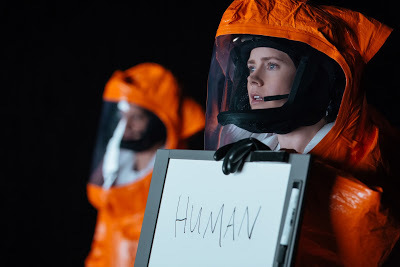 Dr. Louise Banks (Amy Adams) heads a team of experts seeking to establish communication with an alien race in the profound new sci-fi thriller, “Arrival.” Photo courtesy of Paramount Pictures.
Dr. Louise Banks (Amy Adams) heads a team of experts seeking to establish communication with an alien race in the profound new sci-fi thriller, “Arrival.” Photo courtesy of Paramount Pictures.
With potential differences like that, even getting to the most rudimentary aspects of communication and understanding could prove incredibly daunting. Dealing with that can be challenging enough from one terrestrial culture to another. But, when we apply this notion to our interaction with a totally foreign species, the ante can be upped considerably. Suppose, for example, we believe that the functioning of reality operates according to certain fundamental, mutually agreed-upon concepts. But what if another species is convinced that existence relies on a completely different set of underlying principles? Our heartfelt convictions and basic assumptions about the nature of reality – and our ability to attempt to communicate about it – would run into a major roadblock before the process even starts.
This brings us back to the importance of sincerely believing that communication and understanding across the species boundary is genuinely possible. If we’re unable to envision such a possibility, however, we’ll never get past square one. But, if we allow ourselves to believe that such dealings are truly possible, we open the door to making them happen.
This involves each side making it possible for the other to understand the beliefs that it holds about the fundamental operation of existence. This involves addressing such questions as how does our reality arise? What qualities govern its operation, be they physical, metaphysical, temporal or spiritual? Does everything that happens have an underlying message or purpose, and, if so, how do we discover what they are? Is our existence predetermined and set in stone, or does it make allowances for variability (and, if so, how)?
 An enormous alien craft, one of 12 that have landed around the globe, harbors an enigmatic metaphysical secret in director Denis Villeneuve’s impressive new release, “Arrival.” Photo courtesy of Paramount Pictures.
An enormous alien craft, one of 12 that have landed around the globe, harbors an enigmatic metaphysical secret in director Denis Villeneuve’s impressive new release, “Arrival.” Photo courtesy of Paramount Pictures.
As humans, even if we speak different languages, most of us probably agree to a great extent on the answers to those questions. But, when we attempt to communicate with those of another species, the answers may be very different or even unanswerable. This is where we need to look at bridging our gaps in understanding, and that, again, begins with the beliefs we hold about such possibilities going into the process.
Many of us may have rarely, if ever, given much thought to these kinds of concerns. However, if we hope to succeed in our aspirations of reaching out to beings on other worlds (or even in other dimensions) as full-fledged, actively participating citizens of the Universe, maybe we had better start giving more consideration to these ideas. We must get past the basic assumption that everyone (including those belonging to other species) all think and believe along the same lines. Such a narrow view could well derail our efforts in these areas before we ever get started. If we really are the inquisitive explorers we profess ourselves to be, we’d be wise to let our consciousness expand, to take a wider view and adopt such an enlarged outlook, lest we be reconciled to isolation or, even worse, the possibility of misunderstandings that carry devastating consequences.
The lesson in this shouldn’t be lost in our dealings amongst ourselves either. Given the myriad challenges we face on the planet these days, perhaps we should consider taking a closer look at cooperation, rather than competition, in how we relate and interact with one another. Attaining that goal is possible, but, once again, it requires us to embrace beliefs in its feasibility, including those related to envisioning the outcome and being willing to understand the foundational principles that shape our languages, cultures and fundamental worldviews. We might be surprised at what we find, too; we may assume that we have many differences, but we might also find that we have much in common, attributes that can serve as starting points in building bridges over the gaps between us, enabling us to reach a new level of mutual understanding that elevates us to places we may have never before dreamed. It truly could lead us to an “arrival” at a whole new level of awareness about ourselves, our existence and our place in it.
In addition to these grand concepts, many other ideas are explored in this film, most of which are dealt with on a very personal level, as Dr. Banks discovers for herself as she wends her way through the labyrinth of her remarkable odyssey. In many ways, though, what she experiences individually mirrors the story’s bigger questions writ smaller. In either case, though, the lessons raised through the narrative can serve us well, whether we’re talking on a personal level, a cultural level or even a species level.
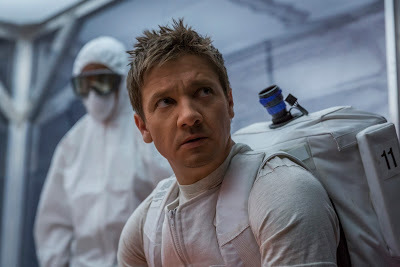 Theoretical physicist Ian Donnelly (Jeremy Renner) is part of a team of experts seeking to establish communication with an alien race in the profound new sci-fi thriller, “Arrival.” Photo courtesy of Paramount Pictures.
Theoretical physicist Ian Donnelly (Jeremy Renner) is part of a team of experts seeking to establish communication with an alien race in the profound new sci-fi thriller, “Arrival.” Photo courtesy of Paramount Pictures.
Without a doubt, “Arrival” is one of the best movies I’ve seen in a very long time. Its suspenseful, atmospheric mood, along with its profound metaphysical message, heartfelt narrative and understated performances, combine to deliver one of the most impressive pictures to come out in years. Director Denis Villeneuve’s edge-of-your-seat, edge-of-your-consciousness thriller succeeds where predecessors like “Interstellar” (2014), “Gravity” (2013) and “2010” (1984) came up short or delivered their messages in much less thoughtful or poetic ways. Those who take the time to truly understand this picture, in much the same way as ardent fans of “Signs” (2002) did, will come away richly rewarded. As for me, I left the theater awed and speechless, and, if you approach it with a similarly open mind, it just may do the same to you.
In an age of rampant polarization (as clearly evidenced by the recent presidential campaign, as well as in a host of other milieus), the need to come together couldn’t be greater. But we must be willing to make a concerted effort to see this through. Failure to do this could leave us full of regrets and dashed hopes, but such undesirable outcomes are indeed avoidable. And to think it can all start with something as simple as effectively learning how to say hello.
Copyright © 2016, by Brent Marchant. All rights reserved.
Something as simple as saying “hello” shouldn’t be difficult, right? But what if we were up against that task in the context of contact with aliens? How would we respond? In fact, where would we even begin? Establishing a connection and effective communication are crucial. However, such critical concerns notwithstanding, an even more fundamental consideration is developing an understanding of how we each view the nature of existence. Without that, we may never even get to hello. These are among the questions a team of experts wrestles with in the profound, thought-provoking new sci-fi thriller, “Arrival.”
When linguistics professor Dr. Louise Banks (Amy Adams) shows up to teach her class one day, she finds the lecture hall nearly empty. She’s somewhat surprised but decides to proceed as usual until one of her students receives a call on her cell phone, who then asks that Dr. Banks turn on the classroom television to one of the news channels. Upon doing so, she and the few remaining students learn that a dozen alien ships have arrived in various locations around the globe. The enormous crafts are quite imposing but don’t appear to be an imminent threat. Nevertheless, jets are scrambled, blockades are set up and a state of emergency is declared. And class, needless to say, is canceled when a university evacuation is ordered.
Dr. Banks returns home to await what’s next. But, before long, she’s contacted by Colonel Weber (Forest Whitaker), a special forces military officer with whom she worked on special projects in the past. Because of her linguistics proficiency, she proved a valuable asset in translating messages related to the war on terror. If she were so helpful in that context, authorities presume, then she must be the go-to person to tap in learning how to communicate with aliens.
Dr. Banks is quickly whisked off to Montana, one of the alien ship landing sites. She’s teamed with theoretical physicist Ian Donnelly (Jeremy Renner), who’s anxious to learn secrets of the aliens’ technology. However, before tackling such complex tasks, Dr. Banks suggests that they address more basic matters – like saying hello – first. Backed by Colonel Weber, Dr. Banks sets out to determine who the visitors are and what their reason is for coming here. This thus sets in motion a remarkable journey of discovery that transcends such obvious questions, prompting Louise, Ian and the Colonel to reassess their views on the very nature of reality and our individual and collective places within it. And, with a world quickly broaching the prospect of global war because of this development, the trio of investigators had better work quickly, not only for humanity’s sake, but also for that of the new arrivals.
 Deciphering an alien “language” is the objective of linguistics professor Dr. Louise Banks (Amy Adams, back to camera) in the thought-provoking new sci-fi thriller, “Arrival.” Photo courtesy of Paramount Pictures.
Deciphering an alien “language” is the objective of linguistics professor Dr. Louise Banks (Amy Adams, back to camera) in the thought-provoking new sci-fi thriller, “Arrival.” Photo courtesy of Paramount Pictures.As the story unfolds, the film becomes more than just another movie about aliens. It goes much deeper to explore what it means to exist, the nature of reality and even the essence of time. This is heady material, to be sure, but it prods viewers into taking a deeper look at who we are, how we live our lives and how we view the functioning of existence. In that sense, the picture is as much a metaphysical treatise as it is an inventive work of fiction but one that truly gives us pause to consider the core of being – and what we might want to do with it.
The ramifications of what’s at stake in this film, both between us and the aliens and amongst ourselves, couldn’t be higher, yet, ironically, they rest on the most fundamental of considerations. If we’re to bridge the gaps between us, be it across species or across cultures, we must be able to understand one another. And, if we’re to achieve that, we must first believe that it’s possible, an essential element of the conscious creation process, the means by which we manifest the reality we experience through the power of our thoughts, beliefs and intents.
As Dr. Bank’s mission clearly illustrates, under such circumstances we must specifically work on establishing beliefs related to our communications skills, particularly the ability to make them function clearly and smoothly in both directions. However, as the intrepid linguist discovers, this involves more than just figuring out the word equivalencies from one language to another. It also requires that we understand the fundamental prevailing worldview that underlies each language in the first place. And, to appreciate that other worldview, we must understand the core beliefs that form its basis, which ultimately may be far different from those that we employ in shaping our outlook.
 Dr. Louise Banks (Amy Adams) heads a team of experts seeking to establish communication with an alien race in the profound new sci-fi thriller, “Arrival.” Photo courtesy of Paramount Pictures.
Dr. Louise Banks (Amy Adams) heads a team of experts seeking to establish communication with an alien race in the profound new sci-fi thriller, “Arrival.” Photo courtesy of Paramount Pictures.With potential differences like that, even getting to the most rudimentary aspects of communication and understanding could prove incredibly daunting. Dealing with that can be challenging enough from one terrestrial culture to another. But, when we apply this notion to our interaction with a totally foreign species, the ante can be upped considerably. Suppose, for example, we believe that the functioning of reality operates according to certain fundamental, mutually agreed-upon concepts. But what if another species is convinced that existence relies on a completely different set of underlying principles? Our heartfelt convictions and basic assumptions about the nature of reality – and our ability to attempt to communicate about it – would run into a major roadblock before the process even starts.
This brings us back to the importance of sincerely believing that communication and understanding across the species boundary is genuinely possible. If we’re unable to envision such a possibility, however, we’ll never get past square one. But, if we allow ourselves to believe that such dealings are truly possible, we open the door to making them happen.
This involves each side making it possible for the other to understand the beliefs that it holds about the fundamental operation of existence. This involves addressing such questions as how does our reality arise? What qualities govern its operation, be they physical, metaphysical, temporal or spiritual? Does everything that happens have an underlying message or purpose, and, if so, how do we discover what they are? Is our existence predetermined and set in stone, or does it make allowances for variability (and, if so, how)?
 An enormous alien craft, one of 12 that have landed around the globe, harbors an enigmatic metaphysical secret in director Denis Villeneuve’s impressive new release, “Arrival.” Photo courtesy of Paramount Pictures.
An enormous alien craft, one of 12 that have landed around the globe, harbors an enigmatic metaphysical secret in director Denis Villeneuve’s impressive new release, “Arrival.” Photo courtesy of Paramount Pictures.As humans, even if we speak different languages, most of us probably agree to a great extent on the answers to those questions. But, when we attempt to communicate with those of another species, the answers may be very different or even unanswerable. This is where we need to look at bridging our gaps in understanding, and that, again, begins with the beliefs we hold about such possibilities going into the process.
Many of us may have rarely, if ever, given much thought to these kinds of concerns. However, if we hope to succeed in our aspirations of reaching out to beings on other worlds (or even in other dimensions) as full-fledged, actively participating citizens of the Universe, maybe we had better start giving more consideration to these ideas. We must get past the basic assumption that everyone (including those belonging to other species) all think and believe along the same lines. Such a narrow view could well derail our efforts in these areas before we ever get started. If we really are the inquisitive explorers we profess ourselves to be, we’d be wise to let our consciousness expand, to take a wider view and adopt such an enlarged outlook, lest we be reconciled to isolation or, even worse, the possibility of misunderstandings that carry devastating consequences.
The lesson in this shouldn’t be lost in our dealings amongst ourselves either. Given the myriad challenges we face on the planet these days, perhaps we should consider taking a closer look at cooperation, rather than competition, in how we relate and interact with one another. Attaining that goal is possible, but, once again, it requires us to embrace beliefs in its feasibility, including those related to envisioning the outcome and being willing to understand the foundational principles that shape our languages, cultures and fundamental worldviews. We might be surprised at what we find, too; we may assume that we have many differences, but we might also find that we have much in common, attributes that can serve as starting points in building bridges over the gaps between us, enabling us to reach a new level of mutual understanding that elevates us to places we may have never before dreamed. It truly could lead us to an “arrival” at a whole new level of awareness about ourselves, our existence and our place in it.
In addition to these grand concepts, many other ideas are explored in this film, most of which are dealt with on a very personal level, as Dr. Banks discovers for herself as she wends her way through the labyrinth of her remarkable odyssey. In many ways, though, what she experiences individually mirrors the story’s bigger questions writ smaller. In either case, though, the lessons raised through the narrative can serve us well, whether we’re talking on a personal level, a cultural level or even a species level.
 Theoretical physicist Ian Donnelly (Jeremy Renner) is part of a team of experts seeking to establish communication with an alien race in the profound new sci-fi thriller, “Arrival.” Photo courtesy of Paramount Pictures.
Theoretical physicist Ian Donnelly (Jeremy Renner) is part of a team of experts seeking to establish communication with an alien race in the profound new sci-fi thriller, “Arrival.” Photo courtesy of Paramount Pictures.Without a doubt, “Arrival” is one of the best movies I’ve seen in a very long time. Its suspenseful, atmospheric mood, along with its profound metaphysical message, heartfelt narrative and understated performances, combine to deliver one of the most impressive pictures to come out in years. Director Denis Villeneuve’s edge-of-your-seat, edge-of-your-consciousness thriller succeeds where predecessors like “Interstellar” (2014), “Gravity” (2013) and “2010” (1984) came up short or delivered their messages in much less thoughtful or poetic ways. Those who take the time to truly understand this picture, in much the same way as ardent fans of “Signs” (2002) did, will come away richly rewarded. As for me, I left the theater awed and speechless, and, if you approach it with a similarly open mind, it just may do the same to you.
In an age of rampant polarization (as clearly evidenced by the recent presidential campaign, as well as in a host of other milieus), the need to come together couldn’t be greater. But we must be willing to make a concerted effort to see this through. Failure to do this could leave us full of regrets and dashed hopes, but such undesirable outcomes are indeed avoidable. And to think it can all start with something as simple as effectively learning how to say hello.
Copyright © 2016, by Brent Marchant. All rights reserved.
Published on November 16, 2016 15:25
On the Radio this Week
Because of the U.S. Thanksgiving holiday, this month’s Movies with Meaning segment on Frankiesense & More radio is being moved up a week to this Thursday, November 17 at 1 pm ET. Join host Frankie Picasso and me as we examine several new film releases. Tune in live or listen to the on-demand podcast for some lively movie talk by clicking here.


Published on November 16, 2016 01:29
November 14, 2016
This Week in Movies with Meaning
Reviews of "Arrival," "Loving" and "A Man Called Ove," along with a radio preview, are all in the latest Movies with Meaning post on the Blog Page of The Good Radio Network, available by clicking here.
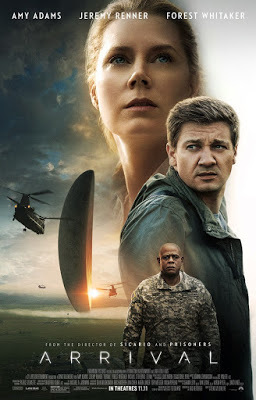
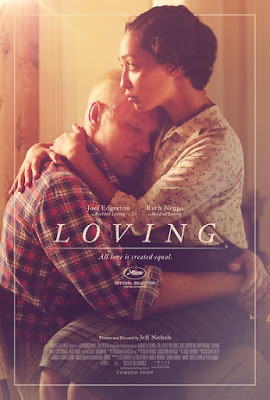
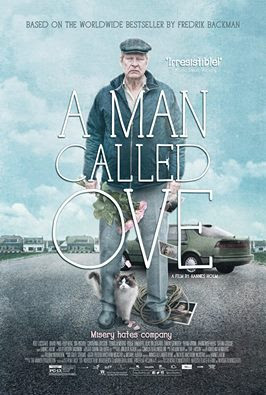
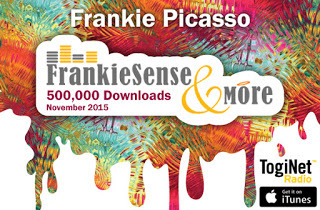






Published on November 14, 2016 03:46
November 2, 2016
‘Moonlight’ illuminates alternative possibilities
“Moonlight” (2016). Cast: Trevante Rhodes, André Holland, Naomie Harris, Mahershala Ali, Ashton Sanders, Alex Hibbert, Janelle Monáe, Jharrel Jerome, Jaden Piner, Patrick Decile. Director: Barry Jenkins. Screenplay: Barry Jenkins. Story: Tarell Alvin McCraney. Web site. Trailer.
Finding ourselves can be a difficult enough experience even under the best of circumstances. But, when the process is burdened by challenges and extenuating circumstances, it can become that much more difficult. So it is for a young man trying to discover himself in the gripping new coming of age drama, “Moonlight.”
The film tells the story of Chiron, a young African-American man growing up in Miami and Atlanta. In recounting his experience, the picture examines three phases of his life – his childhood, when he goes by the nickname Little (Alex Hibbert); his teen years, when he identifies with his given name (Ashton Sanders); and young adulthood, when he reluctantly refers to himself as Black (Trevante Rhodes), a nickname given him by a friend. The names are significant, partly because they serve as the titles of each segment but also because they aptly characterize who Chiron is in each phase of his life.
In many respects, Chiron has a number of strikes against him from the outset. As the son of a drug-addicted mother, Paula (Naomie Harris), and an absent father, the shy, small-framed boy is the regular target of bullies, who pick on him for his size and reserved demeanor. He’s frequently withdrawn, rarely speaking and often unresponsive when asked questions.
However, Little’s not without people in his corner, such as Juan (Mahershala Ali), a Cuban immigrant drug dealer, and Teresa (Janelle Monáe), his kindhearted girlfriend. These unlikely caretakers befriend the young man and attend to his needs, particularly when they witness Paula blatantly shirking her responsibilities to satisfy her drug habit. Little also receives encouragement from his childhood friend, Kevin (Jaden Piner), who tries to bolster his buddy’s self-esteem and teach him how to defend himself. Little needs all the support he can get, too, not just because of his circumstances, but also because of qualities he begins to sense about himself – most notably the fact that he might be gay, a trait often looked upon in the African-American community with feelings that are, at best, conflicted and, at worst, unabashedly close-minded.
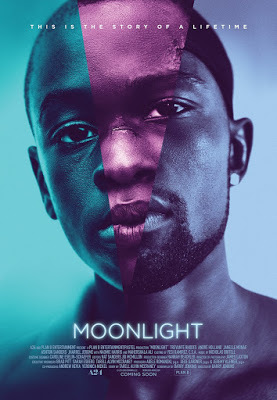
As Chiron enters his teen years, his awareness of his emerging sexuality grows. But, with no readily available role models to draw upon and with homophobic bullies, such as his loud-mouthed classmate Terrel (Patrick Decile), taunting him at seemingly every turn, Chiron becomes an easy target for abuse. Thankfully, a now-teenage Kevin (Jharrel Jerome) is still in Chiron’s life; he tries to stand by his friend but is eventually confronted with his own challenges that make this difficult.
Upon reaching young adulthood, Black takes drastic measures to take control of his life. Having relocated to Atlanta, he charts a different course from who he had been becoming in Miami. But, in many ways, his “new” life is also a throwback to his upbringing. What’s more, despite appearances of being in charge, he’s also decidedly unsure about who he has become. Is he really the person he wants to be? That’s the question he must ask himself, one that he gets a chance to answer when he receives an unexpected late night phone call from Kevin (André Holland), who he lost contact with after leaving Miami. Will Little/Chiron/Black finally learn who he really is?
When we witness a movie like this, we often ask ourselves, “How can events like those depicted here possibly be allowed to go on?” That’s especially true for those of us who tend to view life from an enlightened and open-minded perspective. But, for what it’s worth, not everyone shares those viewpoints. The homophobic and bullying attitudes on display here, regrettably, are all too real, and this film reflects them in all their hateful expression.
So how is it that such close-minded viewpoints are given license to exist? It’s because those who harbor thoughts, beliefs and intents designed to bring them into being see them through to manifestation. That’s the basis of the conscious creation process, the means by which we materialize the reality we experience.
Knowing that, it might be tempting to ask, “If we have a choice with what we do with our thoughts, beliefs and intents, then why don’t we just make better choices, opting for more enlightened pursuits instead of such malignant endeavors?” That’s a fair question, one that many of us would like to hope should be obvious to us all.
If only it were that easy.
For all of the potential good that conscious creation makes possible, the bottom line with this practice is that it makes all options possible, for better or worse, like it or not. This, of necessity, includes those possibilities that we find less desirable or even repugnant. However, because of the experience such negative circumstances afford, we also have the option to make better choices after having lived through them – something we might not understand until after going through those ordeals in the first place. Experience can be quite the teacher, even if its lessons are far from tolerable.
As another film that came out not long ago – “The Birth of a Nation” – aptly illustrates, sometimes we must endure conditions we find unacceptable to come to realize that they are indeed unacceptable. As that picture showed, nearly all of us today would find the concepts of slavery and inhuman brutality reprehensible. But can we truly say the same today when it comes to matters related to homophobia and bullying? Clearly we’ve made considerable progress in these areas, but there’s still room for improvement, as “Moonlight” pointedly shows. We can only hope that the light this film sheds on those subjects will help improve circumstances as we move forward.
Thankfully, even though conscious creation allows for the manifestation of the regrettable, it also just as readily enables the materialization of the positive, the enlightened and the innovative, qualities that help to promote wider acceptance and understanding of those conditions once looked upon as “normal” that subsequently are labeled deplorable. Chiron senses this throughout his upbringing; all he need do now is give himself permission to follow through on what he innately knows is possible.
Again, this is an area where “Moonlight” shines, providing viewers with an experience of the possible, an opportunity to potentially open closed minds. By depicting different options from what has typically been considered the norm, the film explores new possibilities, including both those in these particular subject areas and through the conscious creation process generally. That’s quite an accomplishment, and rarely is it portrayed as effectively as it is here.
In short, “Moonlight” is an important film, one well deserving of all the accolades it has received – and, one would hope, of the awards it’s worthy of winning. It provides a thought-provoking look at what it means to become who we’re destined to be while shaking up entrenched attitudes. In only his second feature-length film, writer-director Barry Jenkins has produced a masterful picture, one that nails its material in virtually every regard from start to finish. Its powerful and sensitive treatment of a touchy subject is handled skillfully, maximizing its impact through incisive writing, creative camera work and top-notch editing. But, above all, the film’s phenomenal ensemble cast (featuring many first-time performers) delivers superb performances across the board, particularly in its seamless depictions of Chiron and Kevin over time.
It’s hard not to come away from this film feeling supremely moved. But that shows the impact of the power of story, and that’s where prospects for change have an opportunity to take root in the minds of individuals and the collective consciousness. Let’s hope “Moonlight” can work its magic in reshaping the hearts and minds of those who would benefit from seeing things from a new perspective, one that ultimately works in the best interests of everyone.
Copyright © 2016, by Brent Marchant. All rights reserved.
Finding ourselves can be a difficult enough experience even under the best of circumstances. But, when the process is burdened by challenges and extenuating circumstances, it can become that much more difficult. So it is for a young man trying to discover himself in the gripping new coming of age drama, “Moonlight.”
The film tells the story of Chiron, a young African-American man growing up in Miami and Atlanta. In recounting his experience, the picture examines three phases of his life – his childhood, when he goes by the nickname Little (Alex Hibbert); his teen years, when he identifies with his given name (Ashton Sanders); and young adulthood, when he reluctantly refers to himself as Black (Trevante Rhodes), a nickname given him by a friend. The names are significant, partly because they serve as the titles of each segment but also because they aptly characterize who Chiron is in each phase of his life.
In many respects, Chiron has a number of strikes against him from the outset. As the son of a drug-addicted mother, Paula (Naomie Harris), and an absent father, the shy, small-framed boy is the regular target of bullies, who pick on him for his size and reserved demeanor. He’s frequently withdrawn, rarely speaking and often unresponsive when asked questions.
However, Little’s not without people in his corner, such as Juan (Mahershala Ali), a Cuban immigrant drug dealer, and Teresa (Janelle Monáe), his kindhearted girlfriend. These unlikely caretakers befriend the young man and attend to his needs, particularly when they witness Paula blatantly shirking her responsibilities to satisfy her drug habit. Little also receives encouragement from his childhood friend, Kevin (Jaden Piner), who tries to bolster his buddy’s self-esteem and teach him how to defend himself. Little needs all the support he can get, too, not just because of his circumstances, but also because of qualities he begins to sense about himself – most notably the fact that he might be gay, a trait often looked upon in the African-American community with feelings that are, at best, conflicted and, at worst, unabashedly close-minded.

As Chiron enters his teen years, his awareness of his emerging sexuality grows. But, with no readily available role models to draw upon and with homophobic bullies, such as his loud-mouthed classmate Terrel (Patrick Decile), taunting him at seemingly every turn, Chiron becomes an easy target for abuse. Thankfully, a now-teenage Kevin (Jharrel Jerome) is still in Chiron’s life; he tries to stand by his friend but is eventually confronted with his own challenges that make this difficult.
Upon reaching young adulthood, Black takes drastic measures to take control of his life. Having relocated to Atlanta, he charts a different course from who he had been becoming in Miami. But, in many ways, his “new” life is also a throwback to his upbringing. What’s more, despite appearances of being in charge, he’s also decidedly unsure about who he has become. Is he really the person he wants to be? That’s the question he must ask himself, one that he gets a chance to answer when he receives an unexpected late night phone call from Kevin (André Holland), who he lost contact with after leaving Miami. Will Little/Chiron/Black finally learn who he really is?
When we witness a movie like this, we often ask ourselves, “How can events like those depicted here possibly be allowed to go on?” That’s especially true for those of us who tend to view life from an enlightened and open-minded perspective. But, for what it’s worth, not everyone shares those viewpoints. The homophobic and bullying attitudes on display here, regrettably, are all too real, and this film reflects them in all their hateful expression.
So how is it that such close-minded viewpoints are given license to exist? It’s because those who harbor thoughts, beliefs and intents designed to bring them into being see them through to manifestation. That’s the basis of the conscious creation process, the means by which we materialize the reality we experience.
Knowing that, it might be tempting to ask, “If we have a choice with what we do with our thoughts, beliefs and intents, then why don’t we just make better choices, opting for more enlightened pursuits instead of such malignant endeavors?” That’s a fair question, one that many of us would like to hope should be obvious to us all.
If only it were that easy.
For all of the potential good that conscious creation makes possible, the bottom line with this practice is that it makes all options possible, for better or worse, like it or not. This, of necessity, includes those possibilities that we find less desirable or even repugnant. However, because of the experience such negative circumstances afford, we also have the option to make better choices after having lived through them – something we might not understand until after going through those ordeals in the first place. Experience can be quite the teacher, even if its lessons are far from tolerable.
As another film that came out not long ago – “The Birth of a Nation” – aptly illustrates, sometimes we must endure conditions we find unacceptable to come to realize that they are indeed unacceptable. As that picture showed, nearly all of us today would find the concepts of slavery and inhuman brutality reprehensible. But can we truly say the same today when it comes to matters related to homophobia and bullying? Clearly we’ve made considerable progress in these areas, but there’s still room for improvement, as “Moonlight” pointedly shows. We can only hope that the light this film sheds on those subjects will help improve circumstances as we move forward.
Thankfully, even though conscious creation allows for the manifestation of the regrettable, it also just as readily enables the materialization of the positive, the enlightened and the innovative, qualities that help to promote wider acceptance and understanding of those conditions once looked upon as “normal” that subsequently are labeled deplorable. Chiron senses this throughout his upbringing; all he need do now is give himself permission to follow through on what he innately knows is possible.
Again, this is an area where “Moonlight” shines, providing viewers with an experience of the possible, an opportunity to potentially open closed minds. By depicting different options from what has typically been considered the norm, the film explores new possibilities, including both those in these particular subject areas and through the conscious creation process generally. That’s quite an accomplishment, and rarely is it portrayed as effectively as it is here.
In short, “Moonlight” is an important film, one well deserving of all the accolades it has received – and, one would hope, of the awards it’s worthy of winning. It provides a thought-provoking look at what it means to become who we’re destined to be while shaking up entrenched attitudes. In only his second feature-length film, writer-director Barry Jenkins has produced a masterful picture, one that nails its material in virtually every regard from start to finish. Its powerful and sensitive treatment of a touchy subject is handled skillfully, maximizing its impact through incisive writing, creative camera work and top-notch editing. But, above all, the film’s phenomenal ensemble cast (featuring many first-time performers) delivers superb performances across the board, particularly in its seamless depictions of Chiron and Kevin over time.
It’s hard not to come away from this film feeling supremely moved. But that shows the impact of the power of story, and that’s where prospects for change have an opportunity to take root in the minds of individuals and the collective consciousness. Let’s hope “Moonlight” can work its magic in reshaping the hearts and minds of those who would benefit from seeing things from a new perspective, one that ultimately works in the best interests of everyone.
Copyright © 2016, by Brent Marchant. All rights reserved.
Published on November 02, 2016 18:31
November 1, 2016
This Week in Movies with Meaning
Reviews of "Moonlight," "Inferno" and three more movies from the Chicago Film Festival are all in the latest Movies with Meaning post on the Blog Page of The Good Radio Network, available by clicking here.
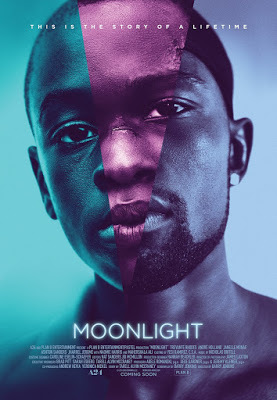
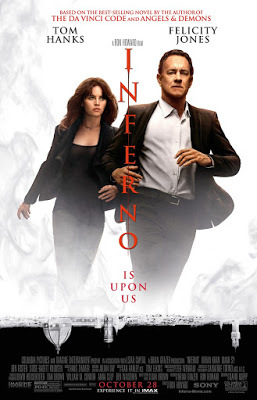
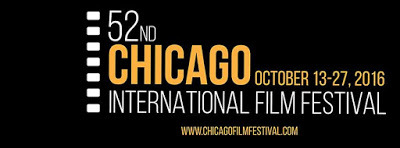





Published on November 01, 2016 16:05
October 26, 2016
‘Anesthesia’ explores our attempts at escape from reality
“Anesthesia” (2015). Cast: Sam Waterston, Glenn Close, Tim Blake Nelson, Corey Stoll, Kristen Stewart, Gretchen Mol, Richard Thomas, K. Todd Freeman, Michael K. Williams, Jessica Hecht, Hannah Marks, Ben Konigsberg, Jacqueline Baum, Ekaterina Samsonov, J. Bernard Calloway, Rob Morgan, Scott Cohen, Gloria Reuben. Director: Tim Blake Nelson. Screenplay: Tim Blake Nelson. Web site. Trailer.
The struggles of everyday life can be overwhelming. They may even be more to cope with than we can handle. And, because of that, many of us may seek avenues of escape from the pain and hardship through various means. But, in doing so, we may unwittingly cut ourselves off from sources of support, comfort and guidance. Such are the themes explored in the engaging multifaceted drama, “Anesthesia,” now available on DVD, Blu-ray disk and video on demand.
In the tradition of films like “Grand Canyon” (1991), “Crash” (2005) and “Disconnect” (2013), “Anesthesia” features a series of seemingly disparate story lines that all eventually become interwoven. In this case, the various narratives revolve around Walter Zarrow (Sam Waterston), a popular New York philosophy professor on the verge of retirement. He looks forward to spending his golden years with Marcia (Glenn Close), his wife of many years whom he positively adores.
 Longtime spouses Walter and Marcia Zarrow (Sam Waterston, left, Glenn Close, right) look forward to spending their golden years together in “Anesthesia,” available on DVD, Blu-ray disk and video on demand. Photo by Anna Kooris, courtesy of IFC Films.
Longtime spouses Walter and Marcia Zarrow (Sam Waterston, left, Glenn Close, right) look forward to spending their golden years together in “Anesthesia,” available on DVD, Blu-ray disk and video on demand. Photo by Anna Kooris, courtesy of IFC Films.
Despite the challenges of urban living and years of intensive personal soul-searching, Walter’s upbeat outlook has endeared him to many. Even those who don’t know him personally somehow end up in his world, perhaps because he’s willing to face life head on and appreciate its virtues rather than looking for ways to anesthetize himself to deaden the pain of daily living, attributes that ultimately encourage others during their tribulations when they hadn’t considered such possibilities. The inspiration he exudes provides an array of lost souls with new hope for living, including those caught up in the following scenarios:
• Walter’s son Adam (Tim Blake Nelson) struggles to deal with a largely dysfunctional family. His teenage children, Hal (Ben Konigsberg) and Ella (Hannah Marks), routinely smoke pot to drown out the seemingly perpetual, overbearing bitching of their mother, Jill (Jessica Hecht). Adam attempts to play mediator, but even his patience gets tried when things become overly strained. And, if that weren’t enough, Adam faces a new challenge when he learns that his wife may have cancer.
• Sophie (Kristen Stewart) is a troubled college student who has considerable difficulty dealing with others. She’s especially bothered by the mindless, self-serving, materialistic attitudes of her peers, as well as the world at large. She feels so overwhelmingly numbed by it all that she desperately looks for ways to feel anything to remind herself that she’s still alive, a search fraught with potentially serious pitfalls.
• Having traded a successful career in New York for the alleged storybook contentment of life in an upscale New Jersey suburb, Sarah (Gretchen Mol), a housewife and mother of two (Jacqueline Baum, Ekaterina Samsonov), is bored by her daily routine. Having sacrificed the things she loved for the good of her family, she now regrets her decision but avoids dealing with it by drowning herself in drinking binges. She may not yet be a bona fide alcoholic, but the handwriting is clearly on the wall. And Sarah runs the risk of things getting worse now that she suspects her husband, Sam (Corey Stoll), may be having an affair, despite his ostensibly spurious claim of embarking on regular, prolonged business trips to China.
• Joe (K. Todd Freeman) had much promise in his life at one time. Unfortunately, the pressures of daily living and subsequent drug addiction derailed his plans, leaving him struggling just to get by. Joe’s childhood friend, Jeffrey (Michael K. Williams), seeks to help him through an intervention aimed at getting him into rehab. But will Jeffrey be able to help Joe in time? Will Joe cooperate? And what will happen if the plan fails?
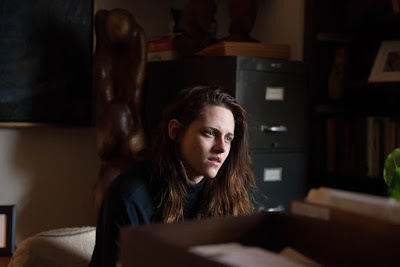 Troubled college student Sophie (Kristen Stewart) desperately looks for ways to remind herself that she’s still alive in an oppressively indifferent world in the engaging drama, “Anesthesia,” available on DVD, Blu-ray disk and video on demand. Photo by Anna Kooris, courtesy of IFC Films.
Troubled college student Sophie (Kristen Stewart) desperately looks for ways to remind herself that she’s still alive in an oppressively indifferent world in the engaging drama, “Anesthesia,” available on DVD, Blu-ray disk and video on demand. Photo by Anna Kooris, courtesy of IFC Films.
As these situations illustrate, there are plenty of ways to deaden the pain associated with life’s difficulties. But are these really the best courses to follow? When inundated by such challenges, it’s easy to believe that there’s nothing else we can do, that there are no other options and that no one’s in our corner. However, that’s seldom the case, and assistance is available as long as we’re willing to make an effort to overcome our adversities. Indeed, in the long run, wouldn’t it be more beneficial to attempt to address our issues rather than sweep them under the rug in futile hopes that they’ll go away on their own? That can be a very empowering experience, one that can bring new meaning to our lives at a time when it seems entirely devoid of it.
The starting point for this is our beliefs, the means by which we manifest the reality we experience through the conscious creation process. When we hold fast to a particular outlook, the existence around us will reflect those intents, and, if we buy into a mode of thinking that there’s no hope, our world will faithfully mimic it. If it becomes daunting enough, we’re likely to want to escape it, as many of the characters in this film attempt. But, given how conscious creation works, wouldn’t it be preferable to change the prevailing reality by altering the beliefs that manifest it rather than simply trying to deny it through “artificial,” substitute means?
 Bored suburban housewife Sarah (Gretchen Mol, left) discusses the possibility that her husband may be having an affair over one of many drinks with her friend Meredith (Gloria Reuben, right) in the engaging drama, “Anesthesia,” available on DVD, Blu-ray disk and video on demand. Photo by Anna Kooris, courtesy of IFC Films.
Bored suburban housewife Sarah (Gretchen Mol, left) discusses the possibility that her husband may be having an affair over one of many drinks with her friend Meredith (Gloria Reuben, right) in the engaging drama, “Anesthesia,” available on DVD, Blu-ray disk and video on demand. Photo by Anna Kooris, courtesy of IFC Films.
That’s the possibility that Sophie, Sarah, Joe, and Adam and his family must weigh as they wrestle with their individual challenges. Whether or not they succeed at this is obviously up to them, particularly when it comes to their ability to envision alternative paths for their lives. And that’s where the importance of inspiration comes into play, as well as their willingness to avail themselves of it. Given that they’ve each drawn a source of encouragement into their lives, as evidenced by Walter’s presence, it’s apparent that they’re looking for something (or someone) to help them chart a new course. The key question, of course, is, “Will they follow through on it?”
Walter’s presence in the characters’ lives also spotlights the inherent connectedness among all of us, and that can prove critical when we go in search of solutions. The inspiration he offers may be just what his peers need to resolve their circumstances, and, because he becomes involved with them to one degree or another, they thus have access to those potentially crucial insights. In the end, drawing upon our connections could be precisely what’s needed to help us turn our lives around and get things back on track. Again, however, if we’re to avail ourselves of this resource, we need to be aware (or to become aware) of the existence of this innate linkage and what it has to offer.
The foregoing considerations effectively illustrate the immense power of story, particularly as it’s portrayed through the movies, as a means for helping us address the issues in our lives. The characters in this film serve as models for the quest we’re all pursuing to seek enlightening paths of guidance. If we can see how this is presented through the experiences of this film’s principals, then perhaps it will become easier for all of us to do the same when we look for ways to make comparable adjustments to our own existence.
“Anesthesia” is a little-known gem that deserves far more recognition than it originally received. I stumbled upon it when viewing its trailer on the DVD of another film, having never heard of this title. After a little research, I learned that this picture premiered at the Tribeca Film Festival in 2015 and had a limited theatrical run before being made available for home viewing. Thankfully, it’s available in a variety of readily accessible formats and is well worth a look.
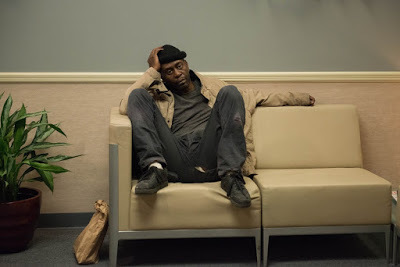 Joe (K. Todd Freeman) reluctantly awaits admission to rehab to treat his drug addiction in “Anesthesia,” available on DVD, Blu-ray disk and video on demand. Photo by Anna Kooris, courtesy of IFC Films.
Joe (K. Todd Freeman) reluctantly awaits admission to rehab to treat his drug addiction in “Anesthesia,” available on DVD, Blu-ray disk and video on demand. Photo by Anna Kooris, courtesy of IFC Films.
The strength of “Anesthesia” is its performances, especially Waterston, Stewart and Mol. The film’s insightful writing is punctuated by a great deal of thoughtfulness and eloquent literary references, something few contemporary pictures handle as well as this one does, especially in Walter’s farewell lecture to his class. Admittedly, the picture wraps up a tad abruptly, but this shortcoming is more than made up for by its many other strengths. Those looking for a contemplative viewing option should give this film serious consideration.
No matter how difficult our circumstances may become, there’s always hope. All is not lost, regardless of how much we may have convinced ourselves of that. By drawing upon the metaphysical resources at our disposal and making appropriate changes in our viewpoints, we can turn things in our favor, as long we’re willing to make the effort to do so – and to believe that it’s entirely possible.
Copyright © 2016, by Brent Marchant. All rights reserved.
The struggles of everyday life can be overwhelming. They may even be more to cope with than we can handle. And, because of that, many of us may seek avenues of escape from the pain and hardship through various means. But, in doing so, we may unwittingly cut ourselves off from sources of support, comfort and guidance. Such are the themes explored in the engaging multifaceted drama, “Anesthesia,” now available on DVD, Blu-ray disk and video on demand.
In the tradition of films like “Grand Canyon” (1991), “Crash” (2005) and “Disconnect” (2013), “Anesthesia” features a series of seemingly disparate story lines that all eventually become interwoven. In this case, the various narratives revolve around Walter Zarrow (Sam Waterston), a popular New York philosophy professor on the verge of retirement. He looks forward to spending his golden years with Marcia (Glenn Close), his wife of many years whom he positively adores.
 Longtime spouses Walter and Marcia Zarrow (Sam Waterston, left, Glenn Close, right) look forward to spending their golden years together in “Anesthesia,” available on DVD, Blu-ray disk and video on demand. Photo by Anna Kooris, courtesy of IFC Films.
Longtime spouses Walter and Marcia Zarrow (Sam Waterston, left, Glenn Close, right) look forward to spending their golden years together in “Anesthesia,” available on DVD, Blu-ray disk and video on demand. Photo by Anna Kooris, courtesy of IFC Films.Despite the challenges of urban living and years of intensive personal soul-searching, Walter’s upbeat outlook has endeared him to many. Even those who don’t know him personally somehow end up in his world, perhaps because he’s willing to face life head on and appreciate its virtues rather than looking for ways to anesthetize himself to deaden the pain of daily living, attributes that ultimately encourage others during their tribulations when they hadn’t considered such possibilities. The inspiration he exudes provides an array of lost souls with new hope for living, including those caught up in the following scenarios:
• Walter’s son Adam (Tim Blake Nelson) struggles to deal with a largely dysfunctional family. His teenage children, Hal (Ben Konigsberg) and Ella (Hannah Marks), routinely smoke pot to drown out the seemingly perpetual, overbearing bitching of their mother, Jill (Jessica Hecht). Adam attempts to play mediator, but even his patience gets tried when things become overly strained. And, if that weren’t enough, Adam faces a new challenge when he learns that his wife may have cancer.
• Sophie (Kristen Stewart) is a troubled college student who has considerable difficulty dealing with others. She’s especially bothered by the mindless, self-serving, materialistic attitudes of her peers, as well as the world at large. She feels so overwhelmingly numbed by it all that she desperately looks for ways to feel anything to remind herself that she’s still alive, a search fraught with potentially serious pitfalls.
• Having traded a successful career in New York for the alleged storybook contentment of life in an upscale New Jersey suburb, Sarah (Gretchen Mol), a housewife and mother of two (Jacqueline Baum, Ekaterina Samsonov), is bored by her daily routine. Having sacrificed the things she loved for the good of her family, she now regrets her decision but avoids dealing with it by drowning herself in drinking binges. She may not yet be a bona fide alcoholic, but the handwriting is clearly on the wall. And Sarah runs the risk of things getting worse now that she suspects her husband, Sam (Corey Stoll), may be having an affair, despite his ostensibly spurious claim of embarking on regular, prolonged business trips to China.
• Joe (K. Todd Freeman) had much promise in his life at one time. Unfortunately, the pressures of daily living and subsequent drug addiction derailed his plans, leaving him struggling just to get by. Joe’s childhood friend, Jeffrey (Michael K. Williams), seeks to help him through an intervention aimed at getting him into rehab. But will Jeffrey be able to help Joe in time? Will Joe cooperate? And what will happen if the plan fails?
 Troubled college student Sophie (Kristen Stewart) desperately looks for ways to remind herself that she’s still alive in an oppressively indifferent world in the engaging drama, “Anesthesia,” available on DVD, Blu-ray disk and video on demand. Photo by Anna Kooris, courtesy of IFC Films.
Troubled college student Sophie (Kristen Stewart) desperately looks for ways to remind herself that she’s still alive in an oppressively indifferent world in the engaging drama, “Anesthesia,” available on DVD, Blu-ray disk and video on demand. Photo by Anna Kooris, courtesy of IFC Films.As these situations illustrate, there are plenty of ways to deaden the pain associated with life’s difficulties. But are these really the best courses to follow? When inundated by such challenges, it’s easy to believe that there’s nothing else we can do, that there are no other options and that no one’s in our corner. However, that’s seldom the case, and assistance is available as long as we’re willing to make an effort to overcome our adversities. Indeed, in the long run, wouldn’t it be more beneficial to attempt to address our issues rather than sweep them under the rug in futile hopes that they’ll go away on their own? That can be a very empowering experience, one that can bring new meaning to our lives at a time when it seems entirely devoid of it.
The starting point for this is our beliefs, the means by which we manifest the reality we experience through the conscious creation process. When we hold fast to a particular outlook, the existence around us will reflect those intents, and, if we buy into a mode of thinking that there’s no hope, our world will faithfully mimic it. If it becomes daunting enough, we’re likely to want to escape it, as many of the characters in this film attempt. But, given how conscious creation works, wouldn’t it be preferable to change the prevailing reality by altering the beliefs that manifest it rather than simply trying to deny it through “artificial,” substitute means?
 Bored suburban housewife Sarah (Gretchen Mol, left) discusses the possibility that her husband may be having an affair over one of many drinks with her friend Meredith (Gloria Reuben, right) in the engaging drama, “Anesthesia,” available on DVD, Blu-ray disk and video on demand. Photo by Anna Kooris, courtesy of IFC Films.
Bored suburban housewife Sarah (Gretchen Mol, left) discusses the possibility that her husband may be having an affair over one of many drinks with her friend Meredith (Gloria Reuben, right) in the engaging drama, “Anesthesia,” available on DVD, Blu-ray disk and video on demand. Photo by Anna Kooris, courtesy of IFC Films.That’s the possibility that Sophie, Sarah, Joe, and Adam and his family must weigh as they wrestle with their individual challenges. Whether or not they succeed at this is obviously up to them, particularly when it comes to their ability to envision alternative paths for their lives. And that’s where the importance of inspiration comes into play, as well as their willingness to avail themselves of it. Given that they’ve each drawn a source of encouragement into their lives, as evidenced by Walter’s presence, it’s apparent that they’re looking for something (or someone) to help them chart a new course. The key question, of course, is, “Will they follow through on it?”
Walter’s presence in the characters’ lives also spotlights the inherent connectedness among all of us, and that can prove critical when we go in search of solutions. The inspiration he offers may be just what his peers need to resolve their circumstances, and, because he becomes involved with them to one degree or another, they thus have access to those potentially crucial insights. In the end, drawing upon our connections could be precisely what’s needed to help us turn our lives around and get things back on track. Again, however, if we’re to avail ourselves of this resource, we need to be aware (or to become aware) of the existence of this innate linkage and what it has to offer.
The foregoing considerations effectively illustrate the immense power of story, particularly as it’s portrayed through the movies, as a means for helping us address the issues in our lives. The characters in this film serve as models for the quest we’re all pursuing to seek enlightening paths of guidance. If we can see how this is presented through the experiences of this film’s principals, then perhaps it will become easier for all of us to do the same when we look for ways to make comparable adjustments to our own existence.
“Anesthesia” is a little-known gem that deserves far more recognition than it originally received. I stumbled upon it when viewing its trailer on the DVD of another film, having never heard of this title. After a little research, I learned that this picture premiered at the Tribeca Film Festival in 2015 and had a limited theatrical run before being made available for home viewing. Thankfully, it’s available in a variety of readily accessible formats and is well worth a look.
 Joe (K. Todd Freeman) reluctantly awaits admission to rehab to treat his drug addiction in “Anesthesia,” available on DVD, Blu-ray disk and video on demand. Photo by Anna Kooris, courtesy of IFC Films.
Joe (K. Todd Freeman) reluctantly awaits admission to rehab to treat his drug addiction in “Anesthesia,” available on DVD, Blu-ray disk and video on demand. Photo by Anna Kooris, courtesy of IFC Films.The strength of “Anesthesia” is its performances, especially Waterston, Stewart and Mol. The film’s insightful writing is punctuated by a great deal of thoughtfulness and eloquent literary references, something few contemporary pictures handle as well as this one does, especially in Walter’s farewell lecture to his class. Admittedly, the picture wraps up a tad abruptly, but this shortcoming is more than made up for by its many other strengths. Those looking for a contemplative viewing option should give this film serious consideration.
No matter how difficult our circumstances may become, there’s always hope. All is not lost, regardless of how much we may have convinced ourselves of that. By drawing upon the metaphysical resources at our disposal and making appropriate changes in our viewpoints, we can turn things in our favor, as long we’re willing to make the effort to do so – and to believe that it’s entirely possible.
Copyright © 2016, by Brent Marchant. All rights reserved.
Published on October 26, 2016 08:00
October 25, 2016
On the Radio This Week
Join me and host Frankie Picasso this Thursday, October 27 at 1 pm ET, for an extended edition of this month's Movies with Meaning segment on Frankiesense & More radio. We'll discuss a number of new movie releases, as well as a wrap-up of the 52nd Chicago International Film Festival. Tune in by clicking here for some lively movie chat! And, in the meantime, to read more about the Festival, click here.
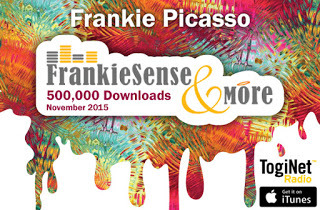





Published on October 25, 2016 22:29
Wrapping Up the Chicago Film Festival
The 52nd annual Chicago International Film Festival is drawing to a close, and I’ve spent much of the past two weeks screening a number of its many fine offerings. Here are brief looks at the pictures I saw, scored on the basis of 1 to 5 (worst to best), the voting system used by Festival attendees to rate the movies shown.
“Kills on Wheels” (“Tiszta szívvel”) (Hungary) (trailer)
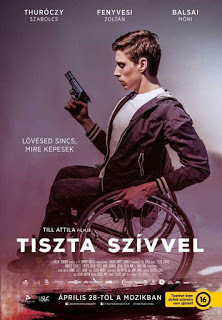
This highly entertaining dark comedy focuses on the exploits of two disabled young men (Zoltán Fenyvesi, Ádám Fekete) who fancy themselves graphic novel artists but who, for economic reasons, are forced to become accomplices to a disabled fireman-turned-hitman (Szabolcs Thuróczy) in helping him carry out the orders of a mob boss (Dusán Vitanovics). In many ways, it would seem that the odds are stacked against the trio of reluctant assassins, but, when pressed, they manage to rise to the occasion, showing how to overcome disabilities that might stop others in their tracks, no matter how dubious the objective.
With its offbeat humor, imaginative cinematography, intriguing mix of photography and animation, terrific soundtrack, and excellent performances by disabled actors in their screen debuts, “Kills on Wheels” truly fires on all cylinders. For its efforts, the film was named the winner of the Festival’s Roger Ebert Award in its New Directors competition.
The clever intersection of two disparate worlds works remarkably well, somewhat reminiscent of the unique fusion presented in “The Crying Game” (1992). This one may be a little graphic for more sensitive viewers, but the violence is always in context and never becomes gratuitous. Look forward to the film’s US DVD release from Kino Lorber next April. Those who appreciate the offbeat will genuinely enjoy this one, so don’t miss it. (5/5)
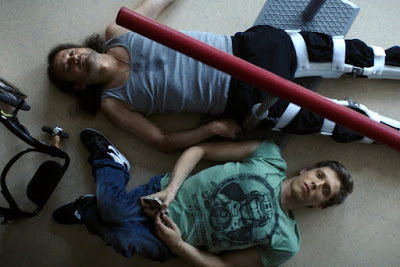 Rupaszov, a disabled fireman-turned-hitman (Szabolcs Thuróczy, top), and his accomplice, Zolika (Zoltán Fenyvesi, bottom), make an unlikely duo of contract assassins in the new Hungarian dark comedy, “Kills on Wheels” (“Tiszta szívvel”).
Rupaszov, a disabled fireman-turned-hitman (Szabolcs Thuróczy, top), and his accomplice, Zolika (Zoltán Fenyvesi, bottom), make an unlikely duo of contract assassins in the new Hungarian dark comedy, “Kills on Wheels” (“Tiszta szívvel”).
“The Teacher” (“Učitelka”) (Slovakia/Czech Republic) (trailer)

This scathing, bitingly satirical look at how Communist Party leaders (including those in seemingly mundane, low-level positions) used their power to manipulate and intimidate others for wholly self-serving purposes in Czechoslovakia in the days before the collapse of the Iron Curtain. The film focuses on the schemings of a conniving grade school teacher (Zuzana Mauréry) who abuses her power to obtain favors from the parents of her students in exchange for good grades – or the opposite for lack of compliance. And, if left unchecked, she just might get away with it, too – that is, until students and parents begin speaking up.
With a well-structured narrative, crisp writing and a superb lead performance by Mauréry, this thoroughly entertaining production reveals the hypocrisy and rampant corruption of a supposedly egalitarian system and what happens when the justifiably disgruntled fight back. An inspiring tale of what it means to reclaim one’s power from those who unreasonably try to steal it. (5/5)
 In Czechoslovakia before the fall of the Iron Curtain, a self-serving teacher and low-level Community Party official (Zuzana Mauréry) abuses her power to get what she wants from the parents of her students in the bitingly satirical new comedy, “The Teacher” (“Učitelka”).
In Czechoslovakia before the fall of the Iron Curtain, a self-serving teacher and low-level Community Party official (Zuzana Mauréry) abuses her power to get what she wants from the parents of her students in the bitingly satirical new comedy, “The Teacher” (“Učitelka”).
“Like Crazy” (“La pazza gioia”) (Italy) (trailer)

This offbeat dark comedy with a heart is a real gem. Chronicling the exploits of two mental patients (Micaela Ramazzotti, Valeria Bruni Tedeschi) who slip away from their institution, the film follows the pair on a wildly funny adventure through Tuscany, telling a story that’s part “Thelma & Louise” (1991), part “King of Hearts” (1966), part “Welcome to Me” (2015), part “One Flew Over the Cuckoo’s Nest” (1975) and part “Forces of Nature” (1999). It also shows that what we think of as mentally challenged may not always be as clear-cut as most of us – including the experts – might think.
The picture is smartly written, well-acted and beautifully photographed, with lots of interesting twists and turns. Despite a slight tendency to wander a bit (understandable given the nature of the protagonists), the film is otherwise spot on in virtually every respect. Enjoy this one! (4/5)
 Escaped mental patients Beatrice (Valeria Bruni Tedeschi, left) and Donatella (Micaela Ramazzotti, right) take off on a wild road trip in the smartly written Italian dark comedy, “Like Crazy” (“La pazza gioia”).
Escaped mental patients Beatrice (Valeria Bruni Tedeschi, left) and Donatella (Micaela Ramazzotti, right) take off on a wild road trip in the smartly written Italian dark comedy, “Like Crazy” (“La pazza gioia”).
“Arctic Heart” (“Le secret des banquises”) (France) (trailer)
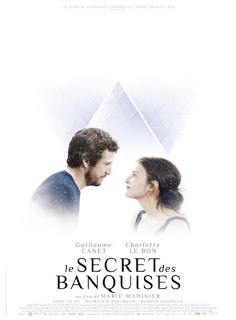
This delightfully offbeat French comedy illustrates the lengths some of us might go to in fulfilling unrequited love – even if it means injecting ourselves with penguin DNA. When a young research associate at a pharmaceutical company (Charlotte Le Bon) tries to catch the eye (and heart) of her handsome but oblivious workaholic boss (Guillaume Canet), she takes drastic measures to capture his attention, with funny, smart, romantic and entertaining results.
Despite its decidedly commercial nature and a closing half-hour that’s a little stretched out, “Arctic Heart” is a real crowd pleaser in virtually every respect. Hilarious bouts of lunacy in the grand tradition of prototypical French farces make for ample laugh-out-loud viewing. A great date movie for those interested in romance that’s not punched out of a cookie-cutter. (4/5)
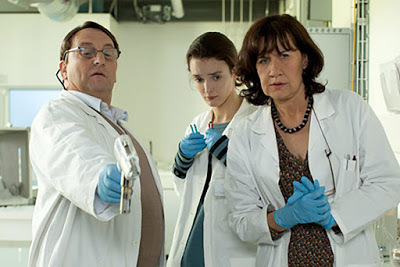 When a young research associate at a pharmaceutical company (Charlotte Le Bon, center) tries to catch the eye (and heart) of her handsome but oblivious workaholic boss (Guillaume Canet, not pictured), she takes drastic measures to capture his attention in the French romantic farce, “Arctic Heart” (“Le secret des banquises”).
When a young research associate at a pharmaceutical company (Charlotte Le Bon, center) tries to catch the eye (and heart) of her handsome but oblivious workaholic boss (Guillaume Canet, not pictured), she takes drastic measures to capture his attention in the French romantic farce, “Arctic Heart” (“Le secret des banquises”).
“Zoology” (“Zoologiya”) (Russia) (trailer)
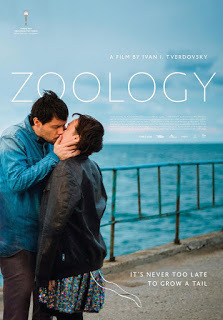
This whimsical comedy about a woman who’s “different” – she has a tail! – examines how the qualities that set her apart from mainstream Russian society affect her interaction with family, co-workers, a prospective love interest and various official institutions, like the church and the medical establishment. In making its statements about conformity, individuality and celebrating our defining characteristics, the film conveys its message while maintaining a mostly light and fun attitude, except when a stronger touch is absolutely called for.
Even with its slight tendency toward uneven pacing, the picture’s a winner on all other fronts. Clearly you won’t see anything like this coming out of American production houses! (4/5)
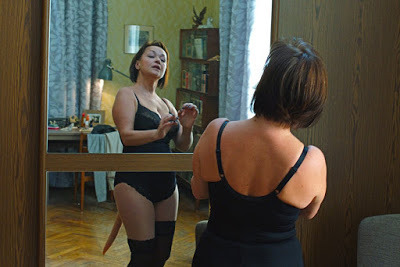 Natascha (Natalya Pavlenkova), a middle-aged, often-ostracized Russian woman who’s “different” – she has a tail! – experiences firsthand how the qualities that set her apart from mainstream society affect her interaction with family, co-workers, a prospective love interest, the church and the medical establishment in the satirical comedy, “Zoology” (“Zoologiya”).
Natascha (Natalya Pavlenkova), a middle-aged, often-ostracized Russian woman who’s “different” – she has a tail! – experiences firsthand how the qualities that set her apart from mainstream society affect her interaction with family, co-workers, a prospective love interest, the church and the medical establishment in the satirical comedy, “Zoology” (“Zoologiya”).
“One Week and a Day” (“Shavua ve Yom” ) (Israel) (web site, trailer)
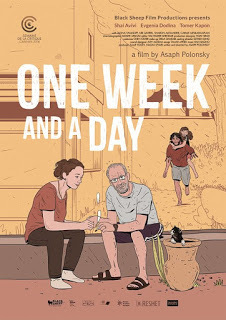
When a middle-aged Israeli couple (Shai Avivi, Jenya Dodina) loses their twenty-something son to illness, they struggle to cope with the meaning of the tragedy. But, with this being such unfamiliar territory, they’re not sure how to proceed, prompting them to try out a number of solutions, from the traditional, like sitting shiva, to the unconventional, including imbibing in their son’s leftover medical marijuana with a goofy neighbor (Tomer Kapon).
This noble attempt at capturing the feelings associated with grief (and the denial of it) showcases an array of mood swings, alternating from the ridiculous to the sublime, in its attempt to capture the range of emotions exhibited by grief-stricken souls struggling to deal with loss. Unfortunately, many of those moods are depicted through sequences that go on a little too long and that, consequently, cause them to lose some of their effectiveness. Some judicious editing and better transitions would have improved this ambitious, well-intentioned effort markedly. With that said, however, the film has been well-received, winning the Cannes Film Festival Gan Foundation Distribution Support Award, as well as nominations for the Festival’s Golden Camera Award and Critics Week Grand Prize. (3/5)
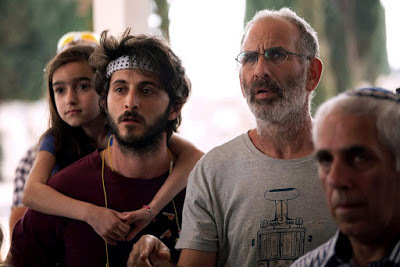 Grieving father Eyal Spivak (Shai Avivi, second from right) struggles to cope with the loss of his son with the aid of his goofy neighbor, Zooler (Tomer Kapon, second from left), in the new Israeli comedy-drama, “One Week and a Day” (“Shavua ve Yom”).
Grieving father Eyal Spivak (Shai Avivi, second from right) struggles to cope with the loss of his son with the aid of his goofy neighbor, Zooler (Tomer Kapon, second from left), in the new Israeli comedy-drama, “One Week and a Day” (“Shavua ve Yom”).
“The Confessions” (“Le confessioni”) (Italy/France) (trailer)
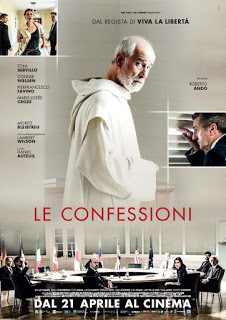
Director Roberto Andò’s subtly satirical look at contemporary politics and economics centers on the mysterious death of an IMF manager (Daniel Auteuil) at a G8 conference after he gives his confession to an enigmatic Italian monk (Toni Servillo). As the story unfolds, revelations emerge about secrets kept by the deceased, as well as those harbored by the other ministers in attendance, many of who feel uneasily compelled to confess in the wake of the summit’s unexpected events. Matters become further complicated by the presence of other unexpected guests, such as a highly successful children’s book author (Connie Nielsen) who seems to know more about what’s going on than anyone is aware of. The implications of those revelations have potentially far-reaching consequences, extending far beyond the lives of those present.
The film’s unusual premise, its intriguing storytelling approach and its multilayered narrative offer viewers a unique moviegoing experience. However, the picture periodically gets bogged down in ideas, imagery and allusions that never feel fully fleshed out (some of which, ironically enough, the director himself was unable to explain during the film’s post-screening Q&A session). A little ambiguity goes a long way, but, when left unchecked, the result is often more muddle than riddle. With a little tidying up, this could have been a remarkable film, but, unfortunately, its shortcomings keep it from reaching its full potential. (3/5)
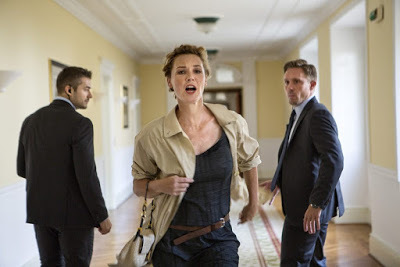 Chaos reigns when an immensely successful author of children’s books (Connie Nielsen, center), an invited guest to a G8 conference, stumbles into an array of secrets, deceptions and international economic intrigue in the Italian-French co-production, “The Confessions” (“Le confessioni”).
Chaos reigns when an immensely successful author of children’s books (Connie Nielsen, center), an invited guest to a G8 conference, stumbles into an array of secrets, deceptions and international economic intrigue in the Italian-French co-production, “The Confessions” (“Le confessioni”).
“The Commune” (“Kollektivet”) (Denmark) (web site, trailer)
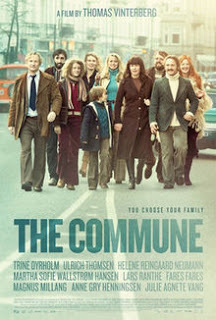
The latest offering from director Thomas Vinterberg (“The Hunt” (2013), “Far from the Madding Crowd” (2015)) takes a sometimes-serious, sometimes-comic look at one family’s experiment in communal living in 1970s Copenhagen. What starts out with the best of intentions undergoes a number of unforeseen twists and turns that disrupts long-standing relationships in both favorable and unfavorable ways. The film probes what it means to explore both our universal connectedness, as well as the need for healthy boundaries.
Despite the film’s compelling performances and inventive premise, the story occasionally stretches credibility, requiring viewers to make substantial leaps of faith as the narrative reaches to make its points, some of which seem incongruent with the basic plot line. The result is a somewhat-satisfying, somewhat-disappointing effort from a director who’s clearly capable of better work. (3/5)
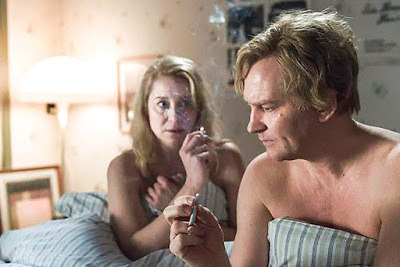 Husband and wife Erik (Ulrich Thomsen, right) and Anna (Trine Dyrholm, left) find themselves in over their heads when they engage in an experiment in communal living in 1970s Copenhagen in director Thomas Vinterberg’s latest offering, “The Commune” (“Kollektivet”).
Husband and wife Erik (Ulrich Thomsen, right) and Anna (Trine Dyrholm, left) find themselves in over their heads when they engage in an experiment in communal living in 1970s Copenhagen in director Thomas Vinterberg’s latest offering, “The Commune” (“Kollektivet”).
“Crosscurrent” (“Chang jiang tu”) (China) (trailer)

This gorgeously filmed journey in search of the head waters of China’s Yangtze River presents a beautiful metaphor of the nation’s political, economic, cultural and spiritual history, reflected through the encounters of a young boat captain (Hao Qin) with a series of female apparitions. In doing so, the picture attempts to fill in some of the knowledge gaps of Chinese viewers (especially younger ones) who may not be aware of much of their country’s heritage prior to the Communist revolution.
Unfortunately, the film’s rather poetically cryptic narrative – as beautiful as it might be – misses the mark in fulfilling its intent of promoting historical and cultural understanding, often leaving viewers more baffled than enlightened. Still, it’s nice to look at, so enjoy the cinematography and the picture’s emotive soundtrack, which are arguably worth the price of admission alone. (3/5)
 When a young boat captain (Hao Qin) seeking the head waters of China’s Yangtze River has a series of encounters with mysterious female apparitions along the way, he comes to realize he’s traversing more than just a waterway in the beautiful, enigmatic fantasy, “Crosscurrent” (“Chang jiang tu”).
When a young boat captain (Hao Qin) seeking the head waters of China’s Yangtze River has a series of encounters with mysterious female apparitions along the way, he comes to realize he’s traversing more than just a waterway in the beautiful, enigmatic fantasy, “Crosscurrent” (“Chang jiang tu”).
“Raw” (“Grave”) (France/Belgium) (trailer)
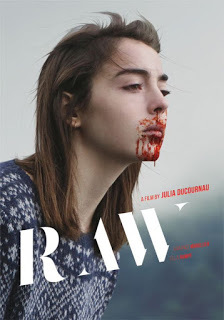
Is it a macabre romp? A feminist manifesto run amok? Sibling rivalry taken to the extreme? Well, it seems this graphic horror offering is trying to be all these things but, regrettably, fails to come together as a complete package.
When a young vegetarian veterinary student (Garance Marillier) tastes meat for the first time as part of a college hazing ritual, she quickly develops a taste for flesh – of all kinds. In attempting to understand her circumstances, she consults her older sister (and fellow student) (Ella Rumpf), who only confuses matters even more, with gruesome consequences.
The film works best when it plays to its self-avowed sense of campy twistedness. Unfortunately, it gets bogged down in too many unsatisfactorily resolved tangents and attempts at seriousness that detract from its principal strengths. A lost opportunity for a scream classic. (2/5)
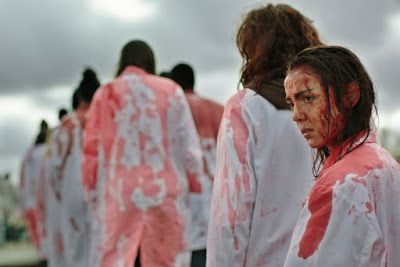 When a young vegetarian veterinary student (Garance Marillier, foreground) tastes meat for the first time as part of a college hazing ritual, she quickly develops a taste for flesh – of all kinds – in the macabre horror flick, “Raw” (“Grave”).
When a young vegetarian veterinary student (Garance Marillier, foreground) tastes meat for the first time as part of a college hazing ritual, she quickly develops a taste for flesh – of all kinds – in the macabre horror flick, “Raw” (“Grave”).
“Panamerican Machinery” (“Maquineria Panamericana”) (Mexico) (trailer)
When the magnanimous owner of a Mexican machinery company that’s arguably the happiest workplace on the planet suddenly dies and leaves his operation bankrupt, the employees are lost to figure out how to carry on, pursuing a variety of options from outright denial to unrestrained hysteria to utter debauchery. But what starts out as a lighthearted, whimsical comedy quickly turns into a heavy-handed, though often-unfocused religious/spiritual satirical commentary whose message becomes increasingly lost in its utter preposterousness. The film goes off the rails as it becomes progressively more ridiculous with each passing frame.
Taking a creative approach to subjects like this is certainly laudable. But, when that creativity morphs into unmitigated absurdity focused more on symbol and metaphor than a cogent narrative, the point becomes lost rather quickly. (1/5)
Faced with the prospect of having to fend for themselves, the employees of a bankrupt Mexican heavy equipment company try different solutions to get by in the overwrought satire, “Panamerican Machinery” (“Maquineria Panamericana”).
“The Darkness” (“Las tinieblas”) (Mexico) (trailer)
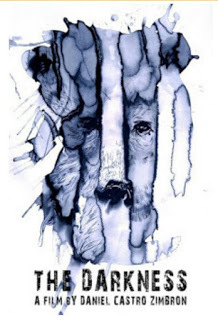
This cinematic attempt at allegory between today’s increasingly fearful culture and the world of a family trapped in a forest cabin under constant threat from an unseen monster unfortunately falls flat from tedious pacing, a meandering narrative, pointless red herrings and an overall lack of focus.
Despite beautiful cinematography and a well-created foreboding overall look and feel, this snoozer never gets on track, leaving viewers waiting for the end. Even diehard horror flick fans would be well advised to pass on this dismal offering. (1/5)
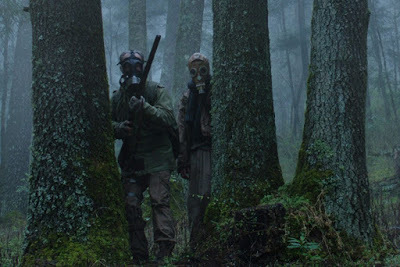 A family tormented by a mysterious woodlands creature takes tentative steps to survive in the atmospheric but ultimately tedious Mexican horror film, “The Darkness” (“Las tinieblas”).
A family tormented by a mysterious woodlands creature takes tentative steps to survive in the atmospheric but ultimately tedious Mexican horror film, “The Darkness” (“Las tinieblas”).
The CIFF features an extensive array of independent, foreign and documentary films in a wide variety of genres, as well as special retrospective screenings and tributes to leading movie industry performers and directors. More than half of the 140+ pictures presented conclude with Q&A sessions with their creators and/or stars after the screenings. It’s quite the event for the serious movie lover, so, if it’s not on your calendar for next year, mark it down now. See you on the red carpet!
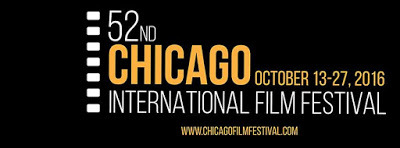
Copyright © 2016, by Brent Marchant. All rights reserved.
“Kills on Wheels” (“Tiszta szívvel”) (Hungary) (trailer)

This highly entertaining dark comedy focuses on the exploits of two disabled young men (Zoltán Fenyvesi, Ádám Fekete) who fancy themselves graphic novel artists but who, for economic reasons, are forced to become accomplices to a disabled fireman-turned-hitman (Szabolcs Thuróczy) in helping him carry out the orders of a mob boss (Dusán Vitanovics). In many ways, it would seem that the odds are stacked against the trio of reluctant assassins, but, when pressed, they manage to rise to the occasion, showing how to overcome disabilities that might stop others in their tracks, no matter how dubious the objective.
With its offbeat humor, imaginative cinematography, intriguing mix of photography and animation, terrific soundtrack, and excellent performances by disabled actors in their screen debuts, “Kills on Wheels” truly fires on all cylinders. For its efforts, the film was named the winner of the Festival’s Roger Ebert Award in its New Directors competition.
The clever intersection of two disparate worlds works remarkably well, somewhat reminiscent of the unique fusion presented in “The Crying Game” (1992). This one may be a little graphic for more sensitive viewers, but the violence is always in context and never becomes gratuitous. Look forward to the film’s US DVD release from Kino Lorber next April. Those who appreciate the offbeat will genuinely enjoy this one, so don’t miss it. (5/5)
 Rupaszov, a disabled fireman-turned-hitman (Szabolcs Thuróczy, top), and his accomplice, Zolika (Zoltán Fenyvesi, bottom), make an unlikely duo of contract assassins in the new Hungarian dark comedy, “Kills on Wheels” (“Tiszta szívvel”).
Rupaszov, a disabled fireman-turned-hitman (Szabolcs Thuróczy, top), and his accomplice, Zolika (Zoltán Fenyvesi, bottom), make an unlikely duo of contract assassins in the new Hungarian dark comedy, “Kills on Wheels” (“Tiszta szívvel”).“The Teacher” (“Učitelka”) (Slovakia/Czech Republic) (trailer)

This scathing, bitingly satirical look at how Communist Party leaders (including those in seemingly mundane, low-level positions) used their power to manipulate and intimidate others for wholly self-serving purposes in Czechoslovakia in the days before the collapse of the Iron Curtain. The film focuses on the schemings of a conniving grade school teacher (Zuzana Mauréry) who abuses her power to obtain favors from the parents of her students in exchange for good grades – or the opposite for lack of compliance. And, if left unchecked, she just might get away with it, too – that is, until students and parents begin speaking up.
With a well-structured narrative, crisp writing and a superb lead performance by Mauréry, this thoroughly entertaining production reveals the hypocrisy and rampant corruption of a supposedly egalitarian system and what happens when the justifiably disgruntled fight back. An inspiring tale of what it means to reclaim one’s power from those who unreasonably try to steal it. (5/5)
 In Czechoslovakia before the fall of the Iron Curtain, a self-serving teacher and low-level Community Party official (Zuzana Mauréry) abuses her power to get what she wants from the parents of her students in the bitingly satirical new comedy, “The Teacher” (“Učitelka”).
In Czechoslovakia before the fall of the Iron Curtain, a self-serving teacher and low-level Community Party official (Zuzana Mauréry) abuses her power to get what she wants from the parents of her students in the bitingly satirical new comedy, “The Teacher” (“Učitelka”).“Like Crazy” (“La pazza gioia”) (Italy) (trailer)

This offbeat dark comedy with a heart is a real gem. Chronicling the exploits of two mental patients (Micaela Ramazzotti, Valeria Bruni Tedeschi) who slip away from their institution, the film follows the pair on a wildly funny adventure through Tuscany, telling a story that’s part “Thelma & Louise” (1991), part “King of Hearts” (1966), part “Welcome to Me” (2015), part “One Flew Over the Cuckoo’s Nest” (1975) and part “Forces of Nature” (1999). It also shows that what we think of as mentally challenged may not always be as clear-cut as most of us – including the experts – might think.
The picture is smartly written, well-acted and beautifully photographed, with lots of interesting twists and turns. Despite a slight tendency to wander a bit (understandable given the nature of the protagonists), the film is otherwise spot on in virtually every respect. Enjoy this one! (4/5)
 Escaped mental patients Beatrice (Valeria Bruni Tedeschi, left) and Donatella (Micaela Ramazzotti, right) take off on a wild road trip in the smartly written Italian dark comedy, “Like Crazy” (“La pazza gioia”).
Escaped mental patients Beatrice (Valeria Bruni Tedeschi, left) and Donatella (Micaela Ramazzotti, right) take off on a wild road trip in the smartly written Italian dark comedy, “Like Crazy” (“La pazza gioia”).“Arctic Heart” (“Le secret des banquises”) (France) (trailer)

This delightfully offbeat French comedy illustrates the lengths some of us might go to in fulfilling unrequited love – even if it means injecting ourselves with penguin DNA. When a young research associate at a pharmaceutical company (Charlotte Le Bon) tries to catch the eye (and heart) of her handsome but oblivious workaholic boss (Guillaume Canet), she takes drastic measures to capture his attention, with funny, smart, romantic and entertaining results.
Despite its decidedly commercial nature and a closing half-hour that’s a little stretched out, “Arctic Heart” is a real crowd pleaser in virtually every respect. Hilarious bouts of lunacy in the grand tradition of prototypical French farces make for ample laugh-out-loud viewing. A great date movie for those interested in romance that’s not punched out of a cookie-cutter. (4/5)
 When a young research associate at a pharmaceutical company (Charlotte Le Bon, center) tries to catch the eye (and heart) of her handsome but oblivious workaholic boss (Guillaume Canet, not pictured), she takes drastic measures to capture his attention in the French romantic farce, “Arctic Heart” (“Le secret des banquises”).
When a young research associate at a pharmaceutical company (Charlotte Le Bon, center) tries to catch the eye (and heart) of her handsome but oblivious workaholic boss (Guillaume Canet, not pictured), she takes drastic measures to capture his attention in the French romantic farce, “Arctic Heart” (“Le secret des banquises”).“Zoology” (“Zoologiya”) (Russia) (trailer)

This whimsical comedy about a woman who’s “different” – she has a tail! – examines how the qualities that set her apart from mainstream Russian society affect her interaction with family, co-workers, a prospective love interest and various official institutions, like the church and the medical establishment. In making its statements about conformity, individuality and celebrating our defining characteristics, the film conveys its message while maintaining a mostly light and fun attitude, except when a stronger touch is absolutely called for.
Even with its slight tendency toward uneven pacing, the picture’s a winner on all other fronts. Clearly you won’t see anything like this coming out of American production houses! (4/5)
 Natascha (Natalya Pavlenkova), a middle-aged, often-ostracized Russian woman who’s “different” – she has a tail! – experiences firsthand how the qualities that set her apart from mainstream society affect her interaction with family, co-workers, a prospective love interest, the church and the medical establishment in the satirical comedy, “Zoology” (“Zoologiya”).
Natascha (Natalya Pavlenkova), a middle-aged, often-ostracized Russian woman who’s “different” – she has a tail! – experiences firsthand how the qualities that set her apart from mainstream society affect her interaction with family, co-workers, a prospective love interest, the church and the medical establishment in the satirical comedy, “Zoology” (“Zoologiya”).“One Week and a Day” (“Shavua ve Yom” ) (Israel) (web site, trailer)

When a middle-aged Israeli couple (Shai Avivi, Jenya Dodina) loses their twenty-something son to illness, they struggle to cope with the meaning of the tragedy. But, with this being such unfamiliar territory, they’re not sure how to proceed, prompting them to try out a number of solutions, from the traditional, like sitting shiva, to the unconventional, including imbibing in their son’s leftover medical marijuana with a goofy neighbor (Tomer Kapon).
This noble attempt at capturing the feelings associated with grief (and the denial of it) showcases an array of mood swings, alternating from the ridiculous to the sublime, in its attempt to capture the range of emotions exhibited by grief-stricken souls struggling to deal with loss. Unfortunately, many of those moods are depicted through sequences that go on a little too long and that, consequently, cause them to lose some of their effectiveness. Some judicious editing and better transitions would have improved this ambitious, well-intentioned effort markedly. With that said, however, the film has been well-received, winning the Cannes Film Festival Gan Foundation Distribution Support Award, as well as nominations for the Festival’s Golden Camera Award and Critics Week Grand Prize. (3/5)
 Grieving father Eyal Spivak (Shai Avivi, second from right) struggles to cope with the loss of his son with the aid of his goofy neighbor, Zooler (Tomer Kapon, second from left), in the new Israeli comedy-drama, “One Week and a Day” (“Shavua ve Yom”).
Grieving father Eyal Spivak (Shai Avivi, second from right) struggles to cope with the loss of his son with the aid of his goofy neighbor, Zooler (Tomer Kapon, second from left), in the new Israeli comedy-drama, “One Week and a Day” (“Shavua ve Yom”).“The Confessions” (“Le confessioni”) (Italy/France) (trailer)

Director Roberto Andò’s subtly satirical look at contemporary politics and economics centers on the mysterious death of an IMF manager (Daniel Auteuil) at a G8 conference after he gives his confession to an enigmatic Italian monk (Toni Servillo). As the story unfolds, revelations emerge about secrets kept by the deceased, as well as those harbored by the other ministers in attendance, many of who feel uneasily compelled to confess in the wake of the summit’s unexpected events. Matters become further complicated by the presence of other unexpected guests, such as a highly successful children’s book author (Connie Nielsen) who seems to know more about what’s going on than anyone is aware of. The implications of those revelations have potentially far-reaching consequences, extending far beyond the lives of those present.
The film’s unusual premise, its intriguing storytelling approach and its multilayered narrative offer viewers a unique moviegoing experience. However, the picture periodically gets bogged down in ideas, imagery and allusions that never feel fully fleshed out (some of which, ironically enough, the director himself was unable to explain during the film’s post-screening Q&A session). A little ambiguity goes a long way, but, when left unchecked, the result is often more muddle than riddle. With a little tidying up, this could have been a remarkable film, but, unfortunately, its shortcomings keep it from reaching its full potential. (3/5)
 Chaos reigns when an immensely successful author of children’s books (Connie Nielsen, center), an invited guest to a G8 conference, stumbles into an array of secrets, deceptions and international economic intrigue in the Italian-French co-production, “The Confessions” (“Le confessioni”).
Chaos reigns when an immensely successful author of children’s books (Connie Nielsen, center), an invited guest to a G8 conference, stumbles into an array of secrets, deceptions and international economic intrigue in the Italian-French co-production, “The Confessions” (“Le confessioni”).“The Commune” (“Kollektivet”) (Denmark) (web site, trailer)

The latest offering from director Thomas Vinterberg (“The Hunt” (2013), “Far from the Madding Crowd” (2015)) takes a sometimes-serious, sometimes-comic look at one family’s experiment in communal living in 1970s Copenhagen. What starts out with the best of intentions undergoes a number of unforeseen twists and turns that disrupts long-standing relationships in both favorable and unfavorable ways. The film probes what it means to explore both our universal connectedness, as well as the need for healthy boundaries.
Despite the film’s compelling performances and inventive premise, the story occasionally stretches credibility, requiring viewers to make substantial leaps of faith as the narrative reaches to make its points, some of which seem incongruent with the basic plot line. The result is a somewhat-satisfying, somewhat-disappointing effort from a director who’s clearly capable of better work. (3/5)
 Husband and wife Erik (Ulrich Thomsen, right) and Anna (Trine Dyrholm, left) find themselves in over their heads when they engage in an experiment in communal living in 1970s Copenhagen in director Thomas Vinterberg’s latest offering, “The Commune” (“Kollektivet”).
Husband and wife Erik (Ulrich Thomsen, right) and Anna (Trine Dyrholm, left) find themselves in over their heads when they engage in an experiment in communal living in 1970s Copenhagen in director Thomas Vinterberg’s latest offering, “The Commune” (“Kollektivet”).“Crosscurrent” (“Chang jiang tu”) (China) (trailer)

This gorgeously filmed journey in search of the head waters of China’s Yangtze River presents a beautiful metaphor of the nation’s political, economic, cultural and spiritual history, reflected through the encounters of a young boat captain (Hao Qin) with a series of female apparitions. In doing so, the picture attempts to fill in some of the knowledge gaps of Chinese viewers (especially younger ones) who may not be aware of much of their country’s heritage prior to the Communist revolution.
Unfortunately, the film’s rather poetically cryptic narrative – as beautiful as it might be – misses the mark in fulfilling its intent of promoting historical and cultural understanding, often leaving viewers more baffled than enlightened. Still, it’s nice to look at, so enjoy the cinematography and the picture’s emotive soundtrack, which are arguably worth the price of admission alone. (3/5)
 When a young boat captain (Hao Qin) seeking the head waters of China’s Yangtze River has a series of encounters with mysterious female apparitions along the way, he comes to realize he’s traversing more than just a waterway in the beautiful, enigmatic fantasy, “Crosscurrent” (“Chang jiang tu”).
When a young boat captain (Hao Qin) seeking the head waters of China’s Yangtze River has a series of encounters with mysterious female apparitions along the way, he comes to realize he’s traversing more than just a waterway in the beautiful, enigmatic fantasy, “Crosscurrent” (“Chang jiang tu”).“Raw” (“Grave”) (France/Belgium) (trailer)

Is it a macabre romp? A feminist manifesto run amok? Sibling rivalry taken to the extreme? Well, it seems this graphic horror offering is trying to be all these things but, regrettably, fails to come together as a complete package.
When a young vegetarian veterinary student (Garance Marillier) tastes meat for the first time as part of a college hazing ritual, she quickly develops a taste for flesh – of all kinds. In attempting to understand her circumstances, she consults her older sister (and fellow student) (Ella Rumpf), who only confuses matters even more, with gruesome consequences.
The film works best when it plays to its self-avowed sense of campy twistedness. Unfortunately, it gets bogged down in too many unsatisfactorily resolved tangents and attempts at seriousness that detract from its principal strengths. A lost opportunity for a scream classic. (2/5)
 When a young vegetarian veterinary student (Garance Marillier, foreground) tastes meat for the first time as part of a college hazing ritual, she quickly develops a taste for flesh – of all kinds – in the macabre horror flick, “Raw” (“Grave”).
When a young vegetarian veterinary student (Garance Marillier, foreground) tastes meat for the first time as part of a college hazing ritual, she quickly develops a taste for flesh – of all kinds – in the macabre horror flick, “Raw” (“Grave”).“Panamerican Machinery” (“Maquineria Panamericana”) (Mexico) (trailer)
When the magnanimous owner of a Mexican machinery company that’s arguably the happiest workplace on the planet suddenly dies and leaves his operation bankrupt, the employees are lost to figure out how to carry on, pursuing a variety of options from outright denial to unrestrained hysteria to utter debauchery. But what starts out as a lighthearted, whimsical comedy quickly turns into a heavy-handed, though often-unfocused religious/spiritual satirical commentary whose message becomes increasingly lost in its utter preposterousness. The film goes off the rails as it becomes progressively more ridiculous with each passing frame.
Taking a creative approach to subjects like this is certainly laudable. But, when that creativity morphs into unmitigated absurdity focused more on symbol and metaphor than a cogent narrative, the point becomes lost rather quickly. (1/5)
Faced with the prospect of having to fend for themselves, the employees of a bankrupt Mexican heavy equipment company try different solutions to get by in the overwrought satire, “Panamerican Machinery” (“Maquineria Panamericana”).
“The Darkness” (“Las tinieblas”) (Mexico) (trailer)

This cinematic attempt at allegory between today’s increasingly fearful culture and the world of a family trapped in a forest cabin under constant threat from an unseen monster unfortunately falls flat from tedious pacing, a meandering narrative, pointless red herrings and an overall lack of focus.
Despite beautiful cinematography and a well-created foreboding overall look and feel, this snoozer never gets on track, leaving viewers waiting for the end. Even diehard horror flick fans would be well advised to pass on this dismal offering. (1/5)
 A family tormented by a mysterious woodlands creature takes tentative steps to survive in the atmospheric but ultimately tedious Mexican horror film, “The Darkness” (“Las tinieblas”).
A family tormented by a mysterious woodlands creature takes tentative steps to survive in the atmospheric but ultimately tedious Mexican horror film, “The Darkness” (“Las tinieblas”).The CIFF features an extensive array of independent, foreign and documentary films in a wide variety of genres, as well as special retrospective screenings and tributes to leading movie industry performers and directors. More than half of the 140+ pictures presented conclude with Q&A sessions with their creators and/or stars after the screenings. It’s quite the event for the serious movie lover, so, if it’s not on your calendar for next year, mark it down now. See you on the red carpet!

Copyright © 2016, by Brent Marchant. All rights reserved.
Published on October 25, 2016 16:42
This Week in Movies with Meaning
Reviews of "Anesthesia," "The Teacher" and "One Week and a Day," as well as a radio show preview, are all available in the latest Movies with Meaning post on the Blog Page of The Good Radio Network, available by clicking here.
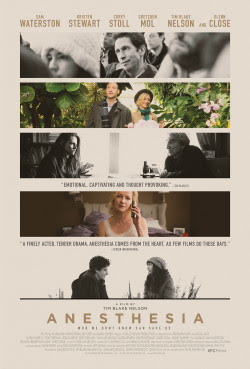

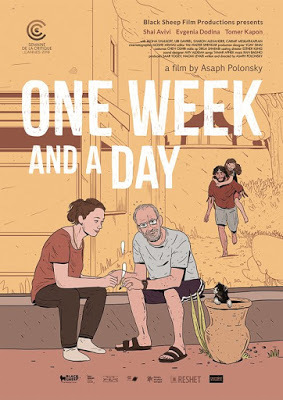





Published on October 25, 2016 04:28
October 21, 2016
‘Birth of a Nation’ delivers a potent cautionary message
“The Birth of a Nation” (2016). Cast: Nate Parker, Armie Hammer, Penelope Ann Miller, Jackie Earle Haley, Mark Boone Jr., Colman Domingo, Aunjanue Ellis, Dwight Henry, Aja Naomi King, Esther Scott, Roger Guenveur Smith, Gabrielle Union, Tony Espinosa, Justin M. Smith, Allen Scott, Griffin Freeman, Kai Norris. Director: Nate Parker. Screenplay: Nate Parker. Story: Nate Parker and Jean McGianni Celestin. Web site. Trailer.
When pushed to the breaking point, there’s no telling how any of us might react. Some may walk away, but others may lash out, perhaps even violently. That’s particularly true for those subjected to an egregious injustice (or, worse, a series of injustices). Retribution often results, frequently with dire consequences, both for the perpetrators of those wrongs, as well as those looking to right them. Such is the case in the new film adaptation of the legendary cautionary tale, “The Birth of a Nation.”
In 1809 Virginia, the Turner cotton plantation was a thriving operation, in large part because of the hard (but coerced) work of its African slaves. However, while many of the area’s other plantation owners routinely treated their slaves brutally, the Turner family took a comparatively progressive approach. Even though they had their prejudices and condescending attitudes and didn’t hesitate to dole out punishment when deemed necessary, the Turners also realized they depended on their slaves for their fortune. Consequently, they tended to treat them somewhat more fairly than many of their neighbors, and they even sought to develop the skills of some of their more adept field hands. They also allowed their own children, such as young Samuel (Griffin Freeman), heir apparent to the family fortune, to play with the children of their slaves, such as young Nat (Tony Espinosa). Their camaraderie led to a friendship of sorts (at least as much as such relationships were allowed).
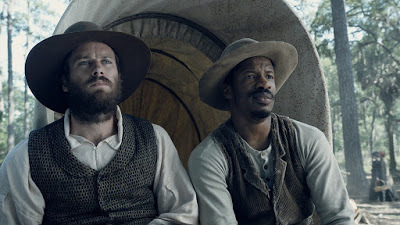 Plantation owner Samuel Turner (Armie Hammer, left) and slave Nat Turner (Nate Parker, right) explore the intricacies of their complex relationship in the new historical drama, “The Birth of a Nation.” Photo courtesy of Fox Searchlight Pictures.
Plantation owner Samuel Turner (Armie Hammer, left) and slave Nat Turner (Nate Parker, right) explore the intricacies of their complex relationship in the new historical drama, “The Birth of a Nation.” Photo courtesy of Fox Searchlight Pictures.
It became apparent early on that young Nat was also remarkably gifted. For example, he possessed a natural affinity for reading, a talent that Turner family matriarch, Miss Elizabeth (Penelope Ann Miller), sought to develop. Even though she refused to teach him about material in the books “that his people wouldn’t understand,” she nevertheless instructed him in the teachings of the Bible, training that qualified him to serve as a preacher to his fellow slaves. And, after years of such tutelage, an elder Nat (Nate Parker) routinely ministered to his peers. With Miss Elizabeth’s encouragement, he even gave occasional scripture readings at the local parish, drawing moderately receptive reactions from White members of the congregation, a response not lost on the resident pastor, Rev. Zalthall (Mark Boone Jr.).
Despite the plantation’s past success, drought and rising costs caused the operation to fall on hard times once an elder Samuel (Armie Hammer) assumed the reins. He needed a way to supplement his income, and Rev. Zalthall came up with a proposal that he believed might fill the financial gap. Given the comfort that Nat seemed to offer his peers, Rev. Zalthall suggested that maybe he could do the same for the slaves at neighboring plantations, many of whom had begun to grow increasingly “restless.” Rev. Zalthall suggested to Samuel that perhaps he could offer Nat’s services to nearby plantation owners for a fee, an arrangement that the Reverend believed would allow everyone to benefit.
Samuel was a bit reluctant to embrace this idea at first, but he eventually agreed, a decision he grew comfortable with once he saw the money begin to roll in. Nat, meanwhile, was pleased for the opportunity to do what he loved, but the experience was an eye-opener for him, especially when he saw firsthand how harshly other plantation owners treated their slaves. This, along with a series of other incidents, led to a simmering ire. When Nat was confronted with the unprovoked beating of his wife (Aja Naomi King) at the hands of bounty hunters, Samuel’s forced prostitution of a fellow slave (Gabrielle Union) to appease one of his financial backers and, eventually, a thrashing of his own for daring to debate scripture with Rev. Zalthall, he reached his limit and decided to strike back, supported by a cadre of peers from his own and surrounding plantations, a response with devastating and bloody consequences.
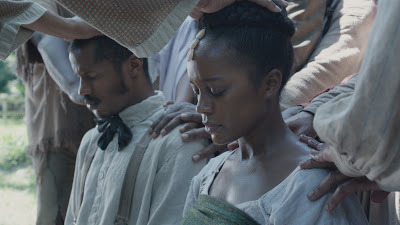 Field hand and occasional preacher Nat Turner (Nate Parker, left) marries his longtime love, Cherry (Aja Naomi King, right), in the haunting new historical drama, “The Birth of a Nation.” Photo courtesy of Fox Searchlight Pictures.
Field hand and occasional preacher Nat Turner (Nate Parker, left) marries his longtime love, Cherry (Aja Naomi King, right), in the haunting new historical drama, “The Birth of a Nation.” Photo courtesy of Fox Searchlight Pictures.
When events like this occur, many enlightened, reasonable souls look upon them and wonder how they could possibly happen. However, if the causes behind such incidents are examined closely, it’s understandable how they arise. This, of course, raises the questions, “Can they be avoided? And, if so, how?”
In scenarios like this, both sides of the conflict need to take a serious look at their actions, which, in turn, means that they also need to examine the underlying beliefs, thoughts and intents that manifested them. This is at the heart of the conscious creation process, the means by which we materialize the reality we experience. Unfortunately, all too often in situations like this, those at the heart of these incidents neglect to take this step, leaving them perplexed, faced with circumstances that are difficult to resolve and often characterized by reactions ranging from challenging to downright harrowing, as was the case here.
Since conscious creation makes it possible to realize all things conceivable – for better or worse – it comes with the territory that even the unconscionable is capable of being made manifest, no matter how unthinkable such creations might seem to many of us. In light of that, one would also likely hope that, once such materializations are given tangible expression, their inherent deplorability becomes so self-evident that any inclination to re-create them would simply vanish without a second thought. Regrettably, however, that is seldom the case, and we fall back into patterns of repetitive creations and behavior.
This is where the power of example – particularly as illustrated through the power of story – can make a difference. By witnessing the impact of such manifestations, we have an opportunity to change our thinking, making it possible to embrace different sets of beliefs and, subsequently, to materialize different outcomes. They truly give us pause to think, “Do we really want to go down that road again?” And, in the case of this story, that question should be pertinent to those on both sides of the conflict portrayed here.
As history has repeatedly shown, inhumane treatment can’t go on forever; a backlash will eventually result, a reaction many would see as understandable. But, in the long run, does retribution really solve anything? It may lead to some reforms in the short term, but does it really get to the heart of the matter? In the case of the race relations issue, nearly 200 years have passed since Nat Turner’s uprising, and yet we’re still dealing with some of the same prejudices and injustices that prompted this incident in the first place. True, they may not be on the same scale as before, but they persist nonetheless. Indeed, if meaningful change is to come, we must address the underlying questions that have caused these issues to begin with. If we ignore the issue and fail to change our beliefs, we may regret our decision.
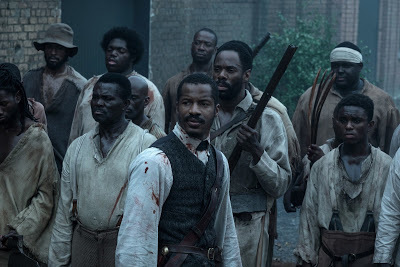 Rebel slave Nat Turner (Nate Parker, center) leads an armed uprising against Virginia plantation owners in “The Birth of a Nation.” Photo by Jahi Chikwendiu, courtesy of Twentieth Century Fox Film Corporation.
Rebel slave Nat Turner (Nate Parker, center) leads an armed uprising against Virginia plantation owners in “The Birth of a Nation.” Photo by Jahi Chikwendiu, courtesy of Twentieth Century Fox Film Corporation.
While “The Birth of a Nation,” on its surface, is a historical drama, it’s also a powerful parable with a strong cautionary message for us today. Its impact is obviously strongest with regard to the race relations issue, but the film’s significance is just as applicable to other contemporary conflicts. Given the current polarization in areas like economic status and political leanings, it’s easy to see the potential for conflict bubbling up from the collective consciousness and into physical existence. We’d be wise to take the picture’s message to heart and take appropriate measures while we have the chance to do so.
“The Birth of a Nation” is a beautifully filmed, well-acted, well-told rendition of Nat Turner’s legacy, even though the historical accuracy of the uprising’s brutality is somewhat downplayed. The picture profoundly depicts the harshness and indignities of slave life in a graphic (though, thankfully, never gratuitous) way, effectively showing viewers only what they need to see and letting their imaginations do the rest (unlike the often-nauseating portrayals wantonly showcased in the highly touted, excessive and cinematically inferior “12 Years a Slave”). Although somewhat episodic at times, the haunting narrative offers a potent, moving message that’s particularly relevant for today’s emotionally charged society.
The film also represents a breakthrough accomplishment for writer-actor-director Nate Parker. His efforts prove quite revelatory, especially since his prior pictures, like “Beyond the Lights” (2014), did more to showcase his physique than his talents. “The Birth of a Nation” has established Parker as a bona fide rising star, someone whose work is worthy of serious merit, perhaps even awards consideration.
We all have our limits, and we should seek to reconcile the differences that push us toward them before reaching them. “The Birth of a Nation” offers us a valuable cautionary tale on that point. And, for the sake of our future, we’d better listen to it.
Copyright © 2016, by Brent Marchant. All rights reserved.
When pushed to the breaking point, there’s no telling how any of us might react. Some may walk away, but others may lash out, perhaps even violently. That’s particularly true for those subjected to an egregious injustice (or, worse, a series of injustices). Retribution often results, frequently with dire consequences, both for the perpetrators of those wrongs, as well as those looking to right them. Such is the case in the new film adaptation of the legendary cautionary tale, “The Birth of a Nation.”
In 1809 Virginia, the Turner cotton plantation was a thriving operation, in large part because of the hard (but coerced) work of its African slaves. However, while many of the area’s other plantation owners routinely treated their slaves brutally, the Turner family took a comparatively progressive approach. Even though they had their prejudices and condescending attitudes and didn’t hesitate to dole out punishment when deemed necessary, the Turners also realized they depended on their slaves for their fortune. Consequently, they tended to treat them somewhat more fairly than many of their neighbors, and they even sought to develop the skills of some of their more adept field hands. They also allowed their own children, such as young Samuel (Griffin Freeman), heir apparent to the family fortune, to play with the children of their slaves, such as young Nat (Tony Espinosa). Their camaraderie led to a friendship of sorts (at least as much as such relationships were allowed).
 Plantation owner Samuel Turner (Armie Hammer, left) and slave Nat Turner (Nate Parker, right) explore the intricacies of their complex relationship in the new historical drama, “The Birth of a Nation.” Photo courtesy of Fox Searchlight Pictures.
Plantation owner Samuel Turner (Armie Hammer, left) and slave Nat Turner (Nate Parker, right) explore the intricacies of their complex relationship in the new historical drama, “The Birth of a Nation.” Photo courtesy of Fox Searchlight Pictures.It became apparent early on that young Nat was also remarkably gifted. For example, he possessed a natural affinity for reading, a talent that Turner family matriarch, Miss Elizabeth (Penelope Ann Miller), sought to develop. Even though she refused to teach him about material in the books “that his people wouldn’t understand,” she nevertheless instructed him in the teachings of the Bible, training that qualified him to serve as a preacher to his fellow slaves. And, after years of such tutelage, an elder Nat (Nate Parker) routinely ministered to his peers. With Miss Elizabeth’s encouragement, he even gave occasional scripture readings at the local parish, drawing moderately receptive reactions from White members of the congregation, a response not lost on the resident pastor, Rev. Zalthall (Mark Boone Jr.).
Despite the plantation’s past success, drought and rising costs caused the operation to fall on hard times once an elder Samuel (Armie Hammer) assumed the reins. He needed a way to supplement his income, and Rev. Zalthall came up with a proposal that he believed might fill the financial gap. Given the comfort that Nat seemed to offer his peers, Rev. Zalthall suggested that maybe he could do the same for the slaves at neighboring plantations, many of whom had begun to grow increasingly “restless.” Rev. Zalthall suggested to Samuel that perhaps he could offer Nat’s services to nearby plantation owners for a fee, an arrangement that the Reverend believed would allow everyone to benefit.
Samuel was a bit reluctant to embrace this idea at first, but he eventually agreed, a decision he grew comfortable with once he saw the money begin to roll in. Nat, meanwhile, was pleased for the opportunity to do what he loved, but the experience was an eye-opener for him, especially when he saw firsthand how harshly other plantation owners treated their slaves. This, along with a series of other incidents, led to a simmering ire. When Nat was confronted with the unprovoked beating of his wife (Aja Naomi King) at the hands of bounty hunters, Samuel’s forced prostitution of a fellow slave (Gabrielle Union) to appease one of his financial backers and, eventually, a thrashing of his own for daring to debate scripture with Rev. Zalthall, he reached his limit and decided to strike back, supported by a cadre of peers from his own and surrounding plantations, a response with devastating and bloody consequences.
 Field hand and occasional preacher Nat Turner (Nate Parker, left) marries his longtime love, Cherry (Aja Naomi King, right), in the haunting new historical drama, “The Birth of a Nation.” Photo courtesy of Fox Searchlight Pictures.
Field hand and occasional preacher Nat Turner (Nate Parker, left) marries his longtime love, Cherry (Aja Naomi King, right), in the haunting new historical drama, “The Birth of a Nation.” Photo courtesy of Fox Searchlight Pictures.When events like this occur, many enlightened, reasonable souls look upon them and wonder how they could possibly happen. However, if the causes behind such incidents are examined closely, it’s understandable how they arise. This, of course, raises the questions, “Can they be avoided? And, if so, how?”
In scenarios like this, both sides of the conflict need to take a serious look at their actions, which, in turn, means that they also need to examine the underlying beliefs, thoughts and intents that manifested them. This is at the heart of the conscious creation process, the means by which we materialize the reality we experience. Unfortunately, all too often in situations like this, those at the heart of these incidents neglect to take this step, leaving them perplexed, faced with circumstances that are difficult to resolve and often characterized by reactions ranging from challenging to downright harrowing, as was the case here.
Since conscious creation makes it possible to realize all things conceivable – for better or worse – it comes with the territory that even the unconscionable is capable of being made manifest, no matter how unthinkable such creations might seem to many of us. In light of that, one would also likely hope that, once such materializations are given tangible expression, their inherent deplorability becomes so self-evident that any inclination to re-create them would simply vanish without a second thought. Regrettably, however, that is seldom the case, and we fall back into patterns of repetitive creations and behavior.
This is where the power of example – particularly as illustrated through the power of story – can make a difference. By witnessing the impact of such manifestations, we have an opportunity to change our thinking, making it possible to embrace different sets of beliefs and, subsequently, to materialize different outcomes. They truly give us pause to think, “Do we really want to go down that road again?” And, in the case of this story, that question should be pertinent to those on both sides of the conflict portrayed here.
As history has repeatedly shown, inhumane treatment can’t go on forever; a backlash will eventually result, a reaction many would see as understandable. But, in the long run, does retribution really solve anything? It may lead to some reforms in the short term, but does it really get to the heart of the matter? In the case of the race relations issue, nearly 200 years have passed since Nat Turner’s uprising, and yet we’re still dealing with some of the same prejudices and injustices that prompted this incident in the first place. True, they may not be on the same scale as before, but they persist nonetheless. Indeed, if meaningful change is to come, we must address the underlying questions that have caused these issues to begin with. If we ignore the issue and fail to change our beliefs, we may regret our decision.
 Rebel slave Nat Turner (Nate Parker, center) leads an armed uprising against Virginia plantation owners in “The Birth of a Nation.” Photo by Jahi Chikwendiu, courtesy of Twentieth Century Fox Film Corporation.
Rebel slave Nat Turner (Nate Parker, center) leads an armed uprising against Virginia plantation owners in “The Birth of a Nation.” Photo by Jahi Chikwendiu, courtesy of Twentieth Century Fox Film Corporation.While “The Birth of a Nation,” on its surface, is a historical drama, it’s also a powerful parable with a strong cautionary message for us today. Its impact is obviously strongest with regard to the race relations issue, but the film’s significance is just as applicable to other contemporary conflicts. Given the current polarization in areas like economic status and political leanings, it’s easy to see the potential for conflict bubbling up from the collective consciousness and into physical existence. We’d be wise to take the picture’s message to heart and take appropriate measures while we have the chance to do so.
“The Birth of a Nation” is a beautifully filmed, well-acted, well-told rendition of Nat Turner’s legacy, even though the historical accuracy of the uprising’s brutality is somewhat downplayed. The picture profoundly depicts the harshness and indignities of slave life in a graphic (though, thankfully, never gratuitous) way, effectively showing viewers only what they need to see and letting their imaginations do the rest (unlike the often-nauseating portrayals wantonly showcased in the highly touted, excessive and cinematically inferior “12 Years a Slave”). Although somewhat episodic at times, the haunting narrative offers a potent, moving message that’s particularly relevant for today’s emotionally charged society.
The film also represents a breakthrough accomplishment for writer-actor-director Nate Parker. His efforts prove quite revelatory, especially since his prior pictures, like “Beyond the Lights” (2014), did more to showcase his physique than his talents. “The Birth of a Nation” has established Parker as a bona fide rising star, someone whose work is worthy of serious merit, perhaps even awards consideration.
We all have our limits, and we should seek to reconcile the differences that push us toward them before reaching them. “The Birth of a Nation” offers us a valuable cautionary tale on that point. And, for the sake of our future, we’d better listen to it.
Copyright © 2016, by Brent Marchant. All rights reserved.
Published on October 21, 2016 06:36



